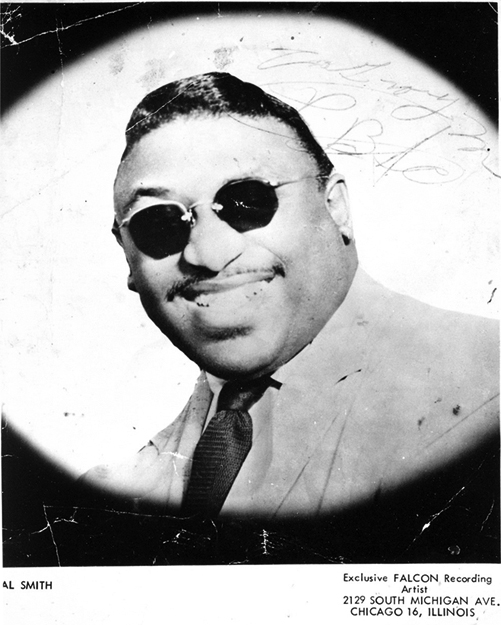
Revision note:We have added information about several Oldies 45 reissues (from 1963) of Vee-Jay sides that Al Smith's group played on.

Biographical sources on Al Smith are few—just Mike Rowe's Chicago Breakdown and Smith's obituary. Albert B. Smith was born in Bolivar County, Mississippi, on November 23, 1923. His family moved to Pace, Mississippi, in 1927. He danced with a jug band on the streets of Rosedale, Mississippi, when he was 7. He learned how to play the string bass in a school band after hearing Big Joe Williams and other Delta bluesmen at his mother's barrelhouse.
After shipping out with the Merchant Marine in 1940, he arrived in Chicago in 1943. In 1945 he started what he referred to as a "bebop" band. According to Rowe, it had 8 pieces plus blues singer Tiny Topsy (it is unlikely that Smith was able to carry all 8 pieces on some of his club engagements, however). Lists of contracts accepted and filed by Musicians Union Local 208 show that Smith and band were working on the South Side sporadically; presumably they were outside of Local 208's territory the rest of the time. On August 15, 1946, Al Smith posted a contract for 2 days at the DuSable Lounge. On September 5, he posted a contract for a week at the Hurricane Lounge; on October 17, "Al. B. Smith" filed a contract for 2 weeks at the Quality Lounge. On March 6, 1947, Smith and band settled into a steadier gig at the Bonaire Lounge, filing for 8 weeks. On January 22, 1948, "Albert" Smith was at the Tradesmen's Lounge for 3 days; this led to a rare mention in the the Chicago Defender, whose January 24 issue ran an ad featuring Al Smith's Band during a Grand Opening at the New Tradesmen's Lounge. Another 3-day contract at the Tradesmen's was filed on February 5. On July 15, he posted another contract with the Bonaire Lounge, for 6 nights, and on August 5, he filed another, covering the nights of July 20 through 26. On October 7, "Albert B. Smith" posted a contract for 1 week at Club 21. On November 18, he filed for 3 nights at the Flamingo Lounge.
After that, he dropped off the contract lists for over 6 months, probably on account of touring. Another rare Defender sighting, on June 18, 1949, had Al Smith and the Band that Rocks playing at the Sawdust Trail. It was after the Sawdust Trail gig that Smith latched onto something steadier. He reappeared on the Local 208 contract list on July 21, 1949, with an "indefinite" deal with the Apex Club in Robbins, Illinois. But Smith's finances weren't on the most secure foundation during this period. On September 1, 1949, the Board of Local 208 heard King Kolax's claim against Al Smith; Kolax had written six arrangements for Smith's band, charging $50, of which Smith still owed $42. "Member Al Smith appeared a few minues later and admitted owing Kolax the money, explaining that he told Kolax in the beginningt that he would pay him if his traveling job was O. K. If not, he would have to pay him the best he could" (Board meeting minutes, September 1, 1949, p. 1). Fortunately, his employers were happy; on November 17, Al Smith filed another indefinite contract with what was now identified as the Apex Country Club. On December 15, he filed yet another with the Apex Show Club. On June 1, 1950, he filed still another indefinite contract with the Apex Country Club. On November 2, he posted a contract for another 2 weeks there.
In April 1951, Smith was back at the Bonaire Lounge, filing an "indefinite" contract on April 5. On July 5, he filed for a week at the Cork Club. On September 6, he posted a contract with El Morocco Lounge, for 2 weeks; this was followed by a 3-week contract on September 20, and a 5-week contract accepted and filed on October 4.
There are no known recordings from this period. In fact, Al Smith did not get on record until April of 1952, when he may have accompanied Johnny Shines on a famous blues session for JOB. Around that time the old Al Smith band broke up; in fact, Al Smith did not appear on the Local 208 list as a leader for 9 months, from December 1951 through August 1952. (His former vocalist, Tiny Topsy, went on to cut some singles for King in the mid and late 1950s.) Sensing how the commercial winds were blowing, Smith formed a smaller ensemble to play R&B.
From Fall 1952 through Spring 1959, Smith was most successful in the bandleading business. This was not on account of his instrumental prowess. Charles Walton said, "He held the bass... OK, he played the bass—but he didn't tune it first." Red Holloway agreed that Smith held the bass (in fact, when Al had to play on a record date he would ask Red to tune the bass for him!). By mid-1958, Smith had phased the studio bass playing out completely in favor of veteran Chicago musician Quinn Wilson, who had already appeared in many of his recording ensembles. Smith did continue to play the bass in bluesman Jimmy Reed's band through the early 1960s, and again other band members had to tune it for him.
Smith was well-liked by musicians; Tommy Hunter said that hardly anyone ever turned down a gig with him. His secret, according to Red, is that he got the gigs, and they always paid well. Lucius Washington recalls playing a dance with Al Smith and being told, "If they don't pay us on the first intermission, we don't play no more." Clearly Al Smith had little to fear from slow-paying promoters. (To put all of this in perspective, keep in mind that the fee for sidemen on Al's recording sessions was straight Union scale. That was $41.25—not always paid promptly, either.)
Among the better-known Chicago musicians who worked with Al Smith were Sonny Cohn, Booby Floyd, Red Holloway, Harold Ashby, Johnny Board, Leon Washington, Eddie Johnson, Lucius Washington (Little Wash), Von Freeman, Mac Easton, Horace Palm, Norman Simmons, Willie Jones, Sun Ra, Lefty Bates, Matt Murphy, Quinn Wilson, Vernel Fournier, Paul Gusman, and Alrock "Al" Duncan.
Between Fall 1952 and Spring 1959, Al Smith had recording sessions sewed up at four different independent labels in Chicago. He led house bands at Chance (1952-1954), Parrot/Blue Lake (1953-1955), United and States (1953-1956), and, most importantly, Vee-Jay (1954-1959). His primary employment in all cases was backing vocal groups, plus an occasional solo singer who didn't have a band. Instrumental tracks (except in the case of his valedictory session in 1959) were done during the studio time left over from vocal sessions.
Al Smith is a common name. At least two other Al Smiths were active in the world of R&B during "our" Al Smith's time. Albert Alan Smith, born May 1936 in Columbus, Ohio, was a soul-blues singer who cut two LPs for Prestige/Bluesville in 1959 and 1960. Alvin K. Smith (born August 8, 1926 in Monroe, Louisiana) sang on recordings with Jack McVea for the Combo and Tag labels in Los Angeles around 1955; he was responsible for other recordings on the West Coast, including some under the name Al King. Thanks to Eric LeBlanc for providing data on the other Als.
Al made one appearance as a sideman on a blues session in April. But he didn't really get going until his new band began its studio work for Chance in October 1952. He probably cut 6 sessions that year.
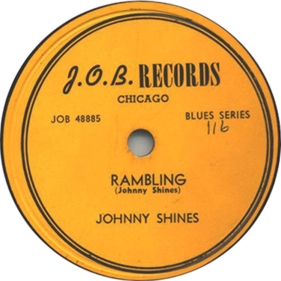
Johnny Shines (eg, voc); Moody Jones (eg -1); prob. Al Smith (b).
Modern Recording Studio, Chicago, April 28, 1952
| JB 48885 | Rambling (Shines) | JOB 116, Blues Classics BC 6, Paula CD 14, Flyright FLYCD 10 | |
| JB 48886 | Fish Tail | Paula CD 14, Flyright FLYCD 10 | |
| JB 48887 | Cool Driver (Shines) -1 | JOB 116, Paula CD 14, Flyright FLYCD 10 | |
| JB 48888 | Ain't Doin' No Good -1 | Paula CD 14, Flyright FLYCD 10 |
Mike Leadbitter and Neal Slaven, Blues Records 1943-1966 give the lineup as Johnny Shines and Al Smith only. But they also mention just the first three matrix numbers, and give no title besides "Ramblin'." By the time the Flyright CD was issued in 1989, discographical research had progressed: all four titles and their matrix numbers were included. The matrix numbers appeared to come from a big session on April 28, 1952 with Snooky Pryor, Moody Jones, Sunnyland Slim, and Alfred Elkins. However, Moody Jones denied recording with Shines. We can be pretty sure about the date, since we now know that the matrix series is from Modern Recording Studios at 55 West Wacker Drive; JOB used Modern regularly from 1950 through the end of 1952.
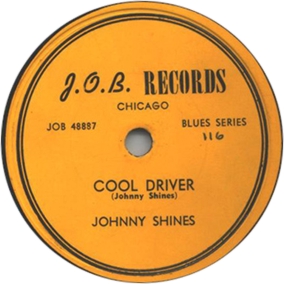
The 1989 notes claim that Moody Jones, if he was there, switched from bass to guitar for "Ain't Doin' No Good." Problem is, the bass is present on all four cuts (it's hardest to hear on "Ain't Doin' No Good," where the second guitar part is fuller)! Besides, there is a second guitar on "Cool Driver," too. The string bass is thuddy and poorly recorded—what we would expect with Al Smith. The only thing that might go against Al is the occasional hint of slap bass. Did he have that in his repertoire?
See our JOB page for the rest of this session. On the Snooky Pryor tracks (JB-48880, 48881, and 48884) Alfred Elkins played bass. On the tracks by Moody Jones (JB-48882 and 48883), Jones played guitar and there is no bass player at all.
Chance Records was a local label, owned by Art Sheridan (later joined by Ewart Abner Jr.). Chance operated from August 1950 to December 1954. From 1950 through mid-1952, Chance used the bands of Wally Hays and then John "Schoolboy" Porter to back singers. But in the fall of 1952, Porter got fed up with job insecurity. He joined the US Air Force, playing in military bands and serving for more than 20 years before he retired in Arizona and embarked on a second music career there. While King Kolax was available for a few sessions, and Ike "Fats" Cole for at least one, Al Smith took over as the label's new house bandleader in the Fall of 1952. He also rehearsed vocal groups in a studio in his basement at 5313 South Drexel.
Jazz discographers normally don't care about the membership of vocal groups. Doo-wop fans and collectors normally pay little attention to the instrumentalists who play on doo-wop dates. Doo-wop discographies ignore the instrumental tracks from a date, while jazz discographies often ignore the vocal ones. So the full dimensions of Al Smith's contributions have not been appreciated. (Then again, Al Smith wasn't highly supportive of jazz research. When Kurt Mohr was working to document the Vee-Jay label in 1961, Smith wouldn't answer any questions because Mohr wasn't paying...)
In September 1952, the Al Smith combo was working Martin's Corner (indefinite contract accepted and filed by Musicians Union Local 208 on September 4). In the middle of the month they switched to Club Evergreen (4 week contract posted on September 18). At Club Evergreen, Smith backed Big Bertha Henderson. He got his entrée to the studio when Chance decided to record her.
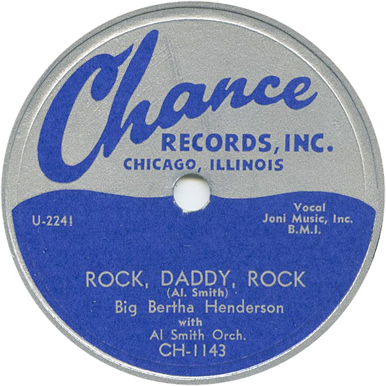
Big Bertha Henderson (voc) with Al Smith Orch.: Al Smith (b, ldr); James "Red" Holloway (ts); Oett "Sax" Mallard (ts); Billy Wallace (p); William "Lefty" Bates (eg); Leon Hooper (d).
Universal Recording, Chicago, October 1952
| U2241 | Rock, Daddy, Rock (Smith) [BBH, ens voc] | Chance 1143, RST 91577 [CD] |
|
| U2242 | Tears in My Eyes (Jones-Smith) [BBH voc]* | Chance 1143*, RST 91577 [CD] |
Tom Lord, in his Jazz Discography,assumes (incorrectly) that this is the same Bertha Henderson who cut three sessions in St. Louis and Chicago between 1925 and 1928. In fact, this Bertha Henderson was from New Orleans and also recorded for Savoy. Lord gives no place or date, but those aren't terribly hard to figure out.
Chance 1143 was a single released in September 1953. RST 91577, Chicago Jump Bands: Early R&B Vol. 1 1945-1953, is a CD issued in 1994; it also includes cuts by several other groups with Sax Mallard. Although Bertha sings, "Rock, Bertha, Rock," and this title is used on the reissue, the original label reads, "Rock, Daddy, Rock."
Lord gives an incorrect horn section for this date: Billy Wallace on trumpet, Red Holloway on alto sax, Sax Mallard on tenor sax, and McKinley Easton on baritone sax. And he does not identify the pianist—even though Billy Wallace played piano on other sessions with Al Smith. The RST notes correct Holloway's instrument to tenor, but retain the trumpet and baritone sax, even though neither can be heard, and do not identify the pianist.
We can see that Al Smith was using musicians who were not part of his working combo for the session. Sax Mallard was leading his own bands during this period.
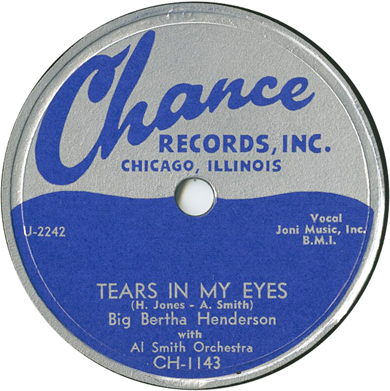
A check of the Chicago Defender reveals that Big "House Rockin" Bertha appeared at Club Evergreen, October 4, 1952, and Big Bertha Henderson was working at Martin's Corner, November 8, 1952. A blurb about her forthcoming release appeared in the issue of November 15, 1952.
Al Smith next moved his combo to the Circle Lounge (3 month contract accepted and filed October 16, 1952; amended to indefinite on November 6). The band also picked up 3 days at the White Rose Lounge (contract also posted on November 6).
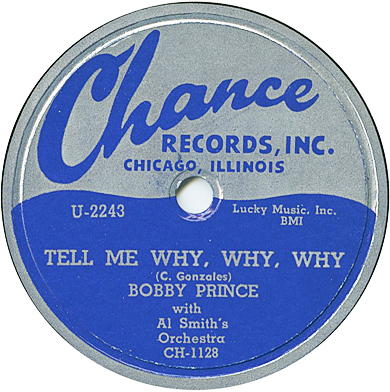
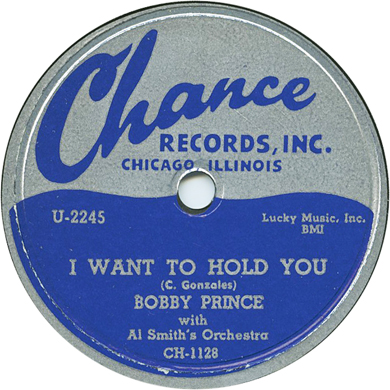
Al Smith (b, ldr); James "Red" Holloway (ts); Eddie Johnson (ts except -1); McKinley Easton (bars except -1); Clarence "Sleepy" Anderson (p); William "Lefty" Bates (eg except -1); Leon Hooper (d); Bobby Prince [Charles Gonzales] (voc).
Universal Recording, Chicago, October 1952
| U-2243 | Tell Me Why, Why, Why (Gonzales)^ [BP, ens voc] | Chance 1128, Vogue V3371 |
|
| U2244 | For Eternity | Chance (unissued) |
|
| U-2245 | I Want to Hold You (Gonzales)^ [BP voc] | Chance 1128, Vogue V3371 | |
| U-2246 | Smoke Gets in Your Eyes (Harbach-Kern) [BP voc] -1 | Chance 1124, Vogue V3372 |
"Smoke" and "I Want to Hold You" have both been listed in discographies as U2245. The matrix numbers in this entry are taken from 78s in Otto Flückiger's collection. Chance 1128 was released in January 1953; it was listed in Billboard as a new release on January 24, 1953 (p. 44) and Chance ran an ad for it the next week (January 31, 1953, p. 40). A Billboardad from February, reprinted in Gart's First Pressings, claims that the single is "on the way to the top" in various markets.
Basic information from Walter Bruyninckx' Swing Discography. Jepsen's Jazz Records conflates this session with the next one. Jepsen's entry for Bobby Prince gives no date or location (and the same personnel as Bruyninckx gave for the instrumental tracks!). Obviously these items were cut at the same date.
Relying on the incorrect personnel printed on the Vogue labels, Bruyninckx incorrectly lists Paul King on trumpet when none can be heard on "Tell Me Why," "Smoke," or "I Want to Hold You." He skips over Lefty Bates' guitar, which is quite audible on "Tell Me Why" and "I Want to Hold You." On "Smoke Gets in Your Eyes" the band is reduced to tenor sax, an eerie, falsetto wordless vocal by Bobby Prince, and rhythm. Red Holloway, in an interview with Armin Büttner and Otto Flückiger, stated that he played tenor and Bobby Prince did the strange vocal. In fact, there are clearly two tenor saxes on this date: all existing discographies incorrectly credit Red with playing alto sax, when none can be heard.
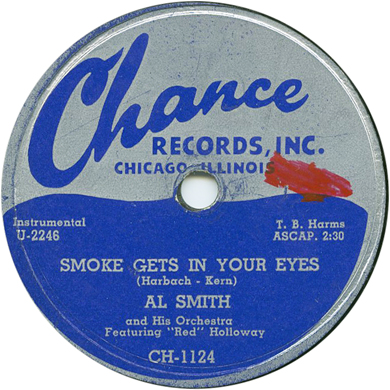
It is not known whether "For Eternity" had a vocal, though the use of "Slow Mood" as an instrumental coupling for "Smoke Gets in Your Eyes" suggests that it did. Discographies say 1953 but given the higher matrix numbers for the precisely dated January 1953 sessions on Chance, late 1952 is obviously correct. Chance 1124 was a 45 and 78-rpm single released at the time, as was Chance 1128. Lord lists Chance 1128 as 1138, which was by Brother John Sellers. Vogue was the French label by that name; V3371 and V3372 were 78-rpm singles released at the time.
In between the previous session and the "Blue Mood" recording, it turns out that U2251 and U2252 were "Didn't I Tell You" and "Crazy Baby," cut by Dr. Jo Jo Adams (voc) with Melvin Moore (tp); Harold Ousley (ts); Dave Young (bars); Eddie Baker (p); Sylvester Hickman (b); and Earl Phillips (d). They were issued on Chance 1127 (misspelled "Change" by Lord).
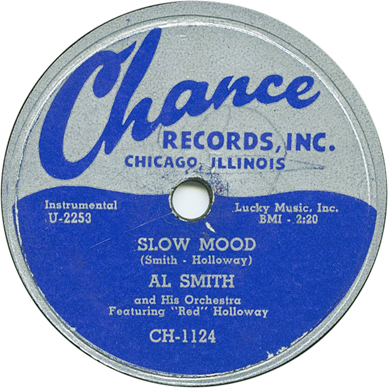
Al Smith (b, ldr); James "Red" Holloway (ts); Billy Wallace (p); Leon Hooper or Paul Gusman (d).
Universal Recording, Chicago, October 1952
| U-2253 | Slow Mood (Smith-Holloway) [Blue Mood^] | Chance 1124, Vogue V3372^ |
Basic information from Jepsen's Jazz Records. The title Chance 1124 (copies in Dr. Robert Stallworth's and Art Zimmerman's collection) is "Slow Mood," and this title was used by Art Sheridan in his list of Chance masters as well. Discographies have given "Blue Mood" as the title, following the Vogue issue. Bruyninckx gives the same date (1953) and lineup, but separates this session from the preceding one. He also gives U2252 as the matrix number instead of 2253. He mentions the Vogue issue whereas Jepsen does not. Both, probably following incorrect personnel on the Vogue labels, are wrong in having Lefty Bates on the session; no guitar is audible. The tenor sax on this piece is clearly Holloway's. Holloway suggests that Paul Gusman may have been the drummer on this date.
The date has been moved back slightly on the evidence of matrix numbers. Chance 1124 was a 45 and 78-rpm single released at the time. Vogue was the French label by that name; V3372 was a 78-rpm single, according to Otto Flückiger.
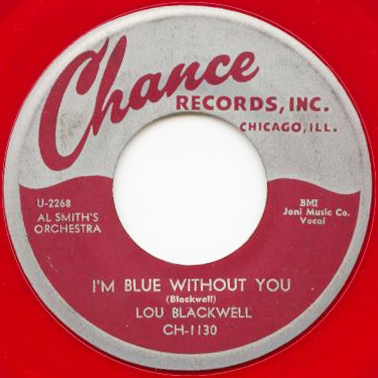
Lou Blackwell acc. by Al Smith Orchestra: Al Smith (b, ldr); Paul King (tp); James "Red" Holloway (as); Oett "Sax" Mallard (ts); McKinley Easton (bars); Clarence "Sleepy" Anderson or Billy Wallace (p); Leon Hooper (d).
Universal Recording, Chicago, November 1952
| U2265 | Blackwell's Blues | unissued | |
| U2266 | untitled blues | unissued | |
| U-2267 | How Blue the Night (J. McHugh) | Chance 1130, Chicago CH-LP 213 | |
| U-2268 | I'm Blue without You (Blackwell) | Chance 1130 |
The basic information on the session is from Lord, who emits the heart-rending cry, "No details." Jepsen gives the Chance issue number. A November 1952 date is consistent with the mention of Lou Blackwell, "Coming out soon on Chance" in Sam Evans' column in Cash Box for November 29, 1952 (p. 21). The single was released on 78 and 45 rpm in February 1953, receiving a review in Cash Box on February 28 (p. 22). Chicago CH-LP 213 was a white-label LP of obscure Chicago R&B.
The list that Art Sheridan provided to the late Marcel Chauvard includes two more matrix numbers attributed (in Chauvard's notes) to someone called "J. Blackwell"; they are almost certainly from this session.
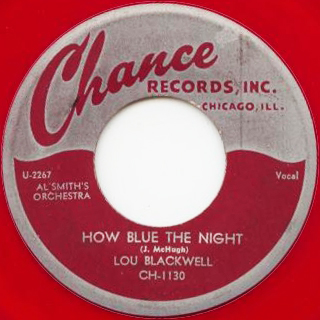
Lou Blackwell, a suave lounge singer who handled some blues, previously cut four never-released sides for Aristocrat in August 1949 and four never-released sides for Chess in May or June 1951. He sang two blues on Tab Smith's session of October 24, 1951 for United; these, too, remained unreleased until the 1990s.
Blackwell finally got a single out of his Chance session. A listen to "How Blue the Night" indicates a larger Al Smith aggregation including trumpet and alto sax. The alto player does not solo, so little can be said about him. However, the bogus band listings that appeared on the Vogue singles seem to describe this session, instead of the sides they ended up being affixed to. Paul King on trumpet and even Red Holloway on alto (instead of his customary tenor) become likely here. Meanwhile, the tenor sax (who gets a short break on "How Blue") resembles Sax Mallard at this period in his development.
Our Chance discography includes two sides recorded around September of 1952 by Skippy Brown (released in February 1953 on Chance 1129) and four by Dr. Jo Jo Adams (no matrix numbers; unissued by Chance). Either or both could have Al Smith accompaniments, but there is no way of knowing without hearing the sides.
Chubby Newsome (voc); others unidentified.
Universal Recording, Chicago, December 1952
| U2275 | Great Day in the Morning | Chance (unissued) | |
| U2276 | Chubby's Story | unissued | |
| U2277 | Shades of Midnight | unissued | |
| U2278 | Always Come Home | unissued |
Information from Lord, who says only Chicago, 1952. This is another session from a period when the Al Smith band was working at Chance. Born in Detroit, Chubby Newsome was an established R&B singer who had recorded for DeLuxe in 1948, and for Regal in 1949 and 1951.
Al Smith worked steadily at Chance, where he laid down 6 sessions during 1953. He also gained entrée to United/ States, where his band backed one vocal group session. He also made an early habit of delegating his instrumental chores on most occasions. Vernel Fournier recalls that Quinn Wilson usually played the bass on studio sessions directed by Al Smith; Red Holloway recalled Al playing the bass himself on just a few occasions (when Red would tune it for him. Unfortunately, our best documentation (for the Vee-Jay sessions in the Mohr-Flückiger-Demeusy files) often does not mention who was standing in for Al on the bass. We will identify Quinn Wilson as the probable bassist on the sessions unless there is reason either to think that Al did it himself or to conclude that someone else was there.
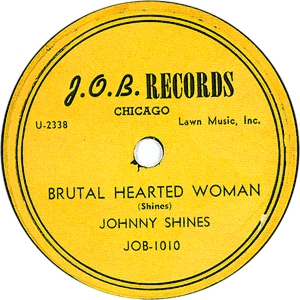
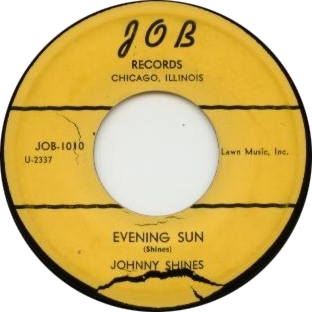
Johnny Shines (eg, voc); Walter Horton (e-hca); Al Smith (b).
Universal Recording, Chicago, January 23, 1953
| U-2337-1 | Evening Shuffle | P-Vine Special [J] PLP-705, Flyright [Br] FLY 563, P-Vine [J] PCD-2176, Flyright [Br] FLYCD 10, Paula PCD-14 | |
| U-2337-2 | Evening Shuffle | P-Vine Special [J] PLP-705, Flyright [Br] FLY 563, Flyright [Br] FLYCD 10, Paula PCD-14, P-Vine [J] PCD-24051 | |
| U-2337-3 | Evening Sun | JOB 1010, Muskadine M 100, XTRA [Br] 1133, P-Vine Special [J] PLP-705, Flyright [Br] FLY 563, Flyright [Br] FLYCD 10, Paula PCD-14, Westside WESD 233 [CD], P-Vine [J] PCD-24051 | |
| U2338-2 | No Name Blues | P-Vine [J] Special PLP-705, Flyright [Br] FLY 563, Flyright [Br] FLYCD 10, Paula PCD-14 | |
| U-2339-1 (U-2338 on label) | Brutal Hearted Woman | JOB 1010, Muskadine 1, Muskadine M 100, XTRA [Br] 1133, P-Vine Special [J] PLP-705, Flyright [Br] FLY 563, Flyright [Br] FLYCD 10, Paula PCD-14, Westside WESD 233 [CD], P-Vine [J] PCD-24051 | |
| U-2340 | Gonna Call the Angel [sic] | P-Vine Special [J] PLP-705, Flyright [Br] FLY 563, Flyright [Br] FLYCD 10, Paula PCD-14, P-Vine [J] PCD-24051 | |
| U-2340-3 | Gonna Call the Angel | P-Vine Special [J] PLP-705, Flyright [Br] FLY 563, Flyright FLYCD 10, Paula PCD-14, P-Vine [J] PCD-24051 |
Here is further confirmation of the incestuous relationship between JOB and Chance, as reported in Mike Rowe's Chicago Breakdown. A JOB session in the Chance matrix number series, with Al Smith on bass! Our information is from the liners to the Flyright CD, which was issued in 1989.
JOB 1010 was probably released in March 1953. Muskadine 1 (c. 1969), Muskadine M 100 (1971), and XTRA 1133 were all titled On the Road Again: An Anthology of Chicago Blues 1947-1954. The tracks that Joe Brown left in the can first saw release in the 1970s on P-Vine Special PLP 705, a Japanese LP released under an arrangement with Art Sheridan of Chance Records. The P-Vine Special PLP 700 LPs precede any business arrangement with Stan Lewis for JOB material; PLP-705, marking the first release for much of this session, came out in Japan in 1977. Flyright FLY 563 was released in Britain in 1980; the title was Johnny Shines & Robert Lockwood: Dust My Broom. Flyright FLYCD 10 and Paula PCD-14, Johnny Shines and Robert Lockwood, came out in 1989 and 1990 respectively. Westside WESD 233 is a compilation of 54 JOB blues tracks on 2 CDs; titled Rough Treatment: The J.O.B. Records Story, it was released in Britain in 2001. P-Vine PCD-24051, Robert Jr. Lockwood & Johnny Shines: Sweet Home Chicago, was released in Japan in 2001.
Steve Franz points out that "Gonna Call the Angel" has been mistitled, courtesy of Shines' occasionally strange modes of pronunciation. The first line of the song appears to go "I'm gonna call the county jail," not "I'm gonna call the angel" or (closer, but still no cigar) "I'm gonna call on account of the angel"—or even "I'm gonna call a kind angel" (which appears in the lyric sheet to several P-Vine releases, going back to PLP-705).
Al Smith (b, ldr); Cliff Davis (ts); Red Holloway (ts); McKinley Easton (bars); Horace Palm (org -1; p -2); Lefty Bates (eg); Alrook "Al" Duncan (d).
Universal Recording, Chicago, January 29, 1953
| U2346-1 | Boogie | unissued | |
| U2346-3 | Boogie | unissued | |
| U2346 U 2346; 45-MR 2346^ |
Beale Street Stomp -1 Chop Chop Boogie ("Leslo")^ |
Meteor 5013 Meteor 5026^ |
U2347-? U 2347; 45-MR 2347^ |
Slidin' Home -1 Hot Rod Special ("Leslo")^ |
Meteor 5013, Charly CRB 1043 Meteor 5026 |
| U2347-7 | Last Call -2 | unissued | |
| U2347-12 | Last Call -2 | P-Vine Special [J] PLP-708, Charly CRB 1043 |
Meteor 5013 was a 45 and 78-rpm single. Billboard listed it as a new R&B release for the week of October 3, 1953. Jepsen's Jazz Records lists only this single, gives no personnel, and gives the date as 1953-1954. Bruyninckx, in his Swing Discography, provides information on the entire session, though his personnel is still incomplete. As the listing of the Chance label by the late Marcel Chauvard, which was based on company files, confirms, this session was recorded for Chance, licensed to Meteor, then finally taken over by Vee-Jay when Ewart Abner moved there. (Ironically, Chance had briefly run a spin-off called Meteor in 1952, but there is no known connection between Art Sheridan's decision to pull back his Meteor, which he eventually replaced with Sabre, and his deal with Lester Bihari's Meteor label, initially located in Memphis and eventually moved to Hollywood.)
Meteor 5026 was a 45 and 78 rpm single, mentioned in Billboard in December 1956. ("Leslo" is one of those code words that the Bihari brothers used to divert composer royalties.) Our basic listing is from Bruyninckx, with help from a copy of the 45 in Dan Kochakian's collection; the label copy is the same on a photo of the 78 that we have seen. Dave Sax has confirmed that Meteor 5026 uses the same takes of the same material that was released on Meteor 5013, so it is a crass retitle job (the Bihari brothers occasionally did these). The new band name was lifted from Elmore James' outfit, which had been a hot seller on Meteor/Flair/RPM.
P-Vine Special PLP-708 was a Japanese LP, released in 1977 under the title Chance Vintage Blues / R&B Crops Vol. 4. Charly CRB 1043, Rootin' and Tootin', is an LP collection of Chicago R&B, mostly from the Vee-Jay label, issued in 1985. "Slidin' Home" is wrongly identified as "Buttermilk" on this LP, out of a confusion with another session (which was mastered in October 1955 for Vee-Jay, but probably recorded in the Spring of 1953; see below). The Charly LP gives a blanket date of 1954-1955 for "Last Call"; Jepsen does not list it at all. The Charly LP cites Red Holloway as the tenor sax soloist on "Last Call," even though no written documentation was available to the compilers. The keyboard on "Last Call" is a piano, but Bruyninckx lists an organist, and "Beale Street Stomp" and "Slidin' Home" (and their later retitlings) do feature organ. Although other sources have given January 23 as the date, the P-Vine LP gives January 29.
Red Holloway said he played the tenor solo on "Slidin' Home" but thought the tenor soloist on "Beale Street Stomp" (a much rougher sounding player) was Cliff Davis. He identifies the drummer as Al Duncan, the guitarist as Lefty Bates, and the baritonist as Mac Easton.
Several people (including two of the present authors) thought at one time that the organist on "Slidin' Home" and "Beale Street Stomp" was Sun Ra. Red Holloway worked with Sun Ra in Al Smith's band. But he did not recall Sunny at any of their recording sessions, and he said the organist on the date "isn't good enough" to be either Sunny or Lonnie Simmons. He believes it was Horace Palm; this would also fit with the switch to piano on "Last Call."
The marathon continued with vocal numbers by Bobby Prince and Tampa Red (who masqueraded as "Jimmy Eager" for the occasion). Because of the complexities, we will break them out as separate sessions.
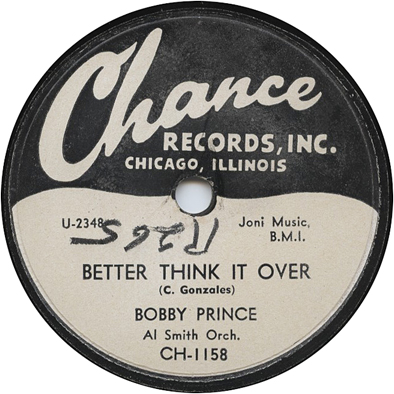
Bobby Prince (voc); Al Smith (b, ldr); Cliff Davis (ts); Red Holloway (ts); McKinley Easton (bars -1; as -2); Horace Palm (p); Lefty Bates (eg); Al Duncan (d).
Universal Recording, Chicago, January 29, 1953
| U2348-2 | Better Think It Over (Gonzales) [BP voc] -1 | Chance 1158, P-Vine Special [J] PLP-708 | |
| U2348-4 | Better Think It Over [BP, ens voc] -1 | P-Vine Special [J] PLP-708 | |
| U2349-2 | If You Only Knew (Gonzales) [BP voc] | Chance 1158 | |
| U2349-4 | In This Misery [If You Only Knew] [BP voc] -2 | P-Vine Special [J] PLP-708 | |
| U2350-1 | I've Got You under My Skin [BP voc] | unissued |
Chance 1158 was a 78-rpm single, released in August 1954. Dr. Robert Stallworth reports that no 45s are known, which is quite unusual for any Chance release past 1130. Jepsen and Bruyninckx appended these two tracks (without matrix numbers) to the previous Bobby Prince session. But Victor Pearlin's brief discography of Bobby Prince in Music World and Record Digest Weekly News, no. 64, p. 12 (September 26, 1979) gives matrix numbers that place these tracks with the session that appeared on Modern.
The P-Vine notes confirms that they originated from the same session, and supply additional detail. A listen to the cuts released on P-Vine Special confirms that this is the same Al Smith group. Even the rough-and-ready ensemble carries over from the instrumental tracks. The tenor sax solos on both versions of "Better Think It Over" appear to be by Cliff Davis; Davis has the intro to "If You Only Knew," while Mac Easton switches to alto sax and has a rare obbligato behind the vocal on both takes of "If You Only Knew." P-Vine incorrectly titled "If You Only Knew," whose release on Chance 1158 was not noted, as "In This Misery." In fact, Prince pleads with his ex to "end this misery." The P-Vine notes claim that Tampa Red was part of the ensemble vocal on "Better Think It Over," take 4, billing it as though Bobby Prince and Tampa Red were doing a duet, but this is is not at all obvious from hearing the cut.
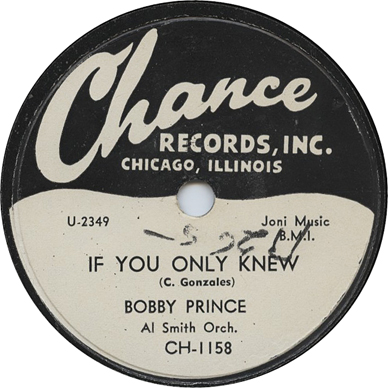
U2348-U2350 are also found in the Chance records listing, which originally derived from a nearly complete list of Chance masters provided by Art Sheridan and Ewart Abner Jr. to the late Marcel Chauvard.
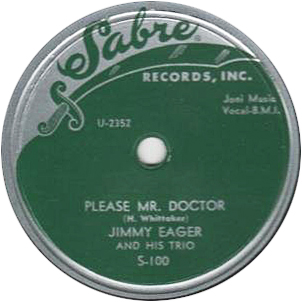
"Jimmy Eager" [Tampa Red] (voc); Lefty Bates (eg); Horace Palm (p); Al Smith (b); Al Duncan (d).
Universal Recording, Chicago, January 29, 1953
| U2351-1 | Baby Please Don't Throw Me Down | unissued | |
| U2351-2 | Baby Please Don't [Throw Me Down] | P-Vine Special [J] PLP-708, Charly [Br] LP-1080, Document DOCD 5215, Charly CDGR 146 | |
| U-2352-1 | Please Mr. Doctor (H. Whittaker) | Sabre 100, Negro Art [Fr] M-12-SB-357, P-Vine Special [J] PLP-708, Charly [Br] LP-1080, Document DOCD 5215, Charly CDGR 146 | |
| U-2353-5 | I Should Have Loved Her More (H. Whittaker) -1 | Sabre 100, Negro Art [Fr] M-12-SB-357, Charly [Br] LP-1080, Document DOCD 5215, Charly CDGR 146 | |
| U2354-2 | Beat That Bop | unissued | |
| U2354-3 | Beat That Bop [TR, ens voc] | P-Vine Special [J] PLP-708, Charly [Br] LP-1080, Document DOCD 5215 |
Thanks to Daniel Gugolz for alerting us to this session. Tampa Red was still under contract to Victor, and would remain so through the end of 1953; hence the cloak-and-dagger stuff, and the lack of instrumental contributions from him. However, the composer credits on the original release went to Hudson Whittaker (Red's real name). Tampa Red had enjoyed steady relationships with different record companies and was not given to moonlighting under pseudonyms. And Sheridan would never remotely have the marketing clout of RCA Victor. Bob Eagle has suggested that Red was experimenting with a more "contemporary" sound on this outing (his final session for RCA would feature Walter Horton and Sonny Boy Williamson No. 2). Another possible reason: both issued sides appear to refer to the final illness of Tampa Red's wife Frances, who died in 1953. Sabre 100 was a single that kicked off the Chance subsidiary in July 1953. Chauvard has the final title as "Bip That Bop," but "Beat That Bop" appears to be correct.
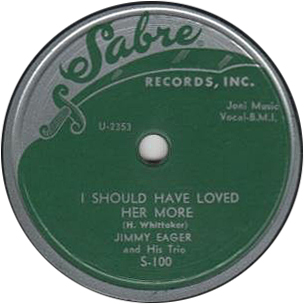
The first reissue of Sabre 100 took place around 1968, as part of a French LP blues anthology series. Negro Art M-12-SB-357 was titled Story of the Blues: Blues Panorama 1. The best documentation of this session is available on the back of P-Vine Special PLP-708, a Japanese compilation from the late 1970s titled Chance Vintage Blues/R&B Crops, Volume 4. The rest of the LP consists of Bobby Prince titles from the previous session, and "Kitty Stevens" items, recorded back in 1947 for Vitacoustic but acquired by Chance in 1952. Charly LP 1080 was titled Chills and Fever: Chicago Blues Masters, Volume 4. Document DOCD 5215 is a CD titled Tampa Red Volume 15 (1951-1953). It was released in 1995. Thanks to Daniel Gugolz for alerting us to this session (the band sounds even rougher behind Tampa Red than during the instrumentals or the Bobby Prince numbers, probably from exhaustion).
Charly CDGR 146, Chicago Blues: The Chance Era, is a 2-CD set released in 1998. The notes to this set claim that Tampa Red was concerned that his guitar playing would be readily detected on the "Jimmy Eager" sides, so he deputized T-Bone Walker-derived bluesman L. C. McKinley. However, Dani Gugolz points out that only one guitar is present on the session, playing a heavily distorted lead as Lefty was sometimes known to do. The Charly notes do not identify Palm or Duncan, and, perhaps taking "Jimmy Eager Trio" too seriously, they omit the string bass entirely.
During these early sessions, Red Holloway was probably a member of Al Smith's working combo. Red went out as a leader toward the end of January 1953, posting an indefinite contract with Ziggy's Gridiron Grill on February 5.
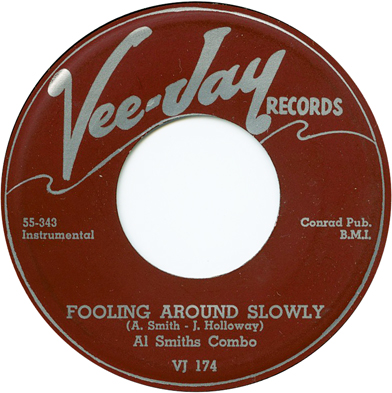
Al Smith (b, ldr); Red Holloway (ts); McKinley Easton (bars); Horace Palm (p); Lefty Bates (eg); poss. Vernel Fournier (d).
Gallatin, Tennessee, prob. Spring 1953
| 55-342 | Buttermilk | unissued | |
| 55-343 | Fooling around Slowly (Smith-Holloway) | Vee-Jay 174, Vee Jay CD NVD2-716 | |
| 55-343 | Fooling around Slowly [alt.] | Charly CRB 1043 |
In past editions of this discography we included 55-342 and 343, "Buttermilk" and "Fooling around Slowly," as part of the session of October 21, 1955 (where their matrix numbers suggest they belong). However, Red Holloway told Armin Büttner that these instrumental numbers were recorded at a radio station in Gallatin, Tennessee, while the Al Smith band was on tour. He recalled that Randy Wood of Randy's Records was involved. Since Randy Wood was a major promoter of R&B in his part of the country, as well as the proprietor of Dot Records, this is plausible. Holloway recalls the date as 1951, but that would be too early for this lineup. Spring 1953 is a lot more likely. In fact, Al Smith seems to have been out of town for a while during February and March, as his next contract as a leader wasn't posted with Local 208 till April 17. At some point these tracks were offered to Vee-Jay, which used one of them as a coupling for a novelty side by Dave "Dizzy" Dixon (see Al39 below).
Vee-Jay 174 was a single released around January 1956. Charly CRB 1043, Rootin' and Tootin', is an LP collection of Chicago R&B from the Vee-Jay label that was issued in 1985. Vee-Jay CD NVD2-716, Sax Appeal, was a various-artists compilation from 1993. On it "Fooling Around Slowly" was abbreviated to "Fool Around Slowly."
Jepsen's Jazz Records gives the October 21, 1955 date, the matrix numbers, and the original release information for "Foolin' around Slowly" and "Buttermilk"—but no personnel. The Charly LP simply gives "1954-1955" as the date for "Foolin' around Slowly". The Charly LP purports to to contain "Buttermilk" but actually includes "Slidin' Home" from the January 29, 1953 session for Chance/Sabre/Meteor. Poor documentation, of both the Chance tracks and the Vee-Jay tracks, is the probable cause of this error. The Vee-Jay Master Book actually gives the title of 55-342 as "Buttermilk," then adds the issued title as "Soup Line," which is really one of the Dizzy Dixon numbers recorded in November 1955 (Al 37 below). Besides, these instrumentals were probably cut not too long after the Chance/Saber session.
Bruyninckx mentions Red Holloway (ts) and gives Mac Easton a "probable." The personnel are as identified by Red Holloway. The MFD files give the same personnel for October 21, 1955, which may not offer that much support! Both takes of "Foolin' around Slowly" feature a long solo by Red Holloway and a shorter one by Lefty Bates. Thanks to Daniel Gugolz for alerting us to the existence of the alternate take.
Red Holloway thought the pianist on "Foolin' around Slowly" was Norman Simmons. The identification of Sun Ra as the pianist on this date (some years ago now) was a bit of overenthusiasm by two of the authors.
We formerly included some recording dates for Chance with Red Holloway's Orchestra as Al Smith sessions. However, we now know from Red Holloway's conversations with Otto Flückiger and Armin Büttner that he used a different rhythm section for these dates, one that did not include Al or any of his other regulars. Consequently we have moved the August 1953 date by the Flamingos with Red Holloway's Orchestra; the September 27, 1953 date by the Moonglows with Red Holloway's Band; and the January 10, 1954 session by the Moonglows with Red Holloway's Orchestra into Appendix B at the end of this discography.
After returning to Chicago in early April (our best estimate), Al Smith settled into a gig at the 528 Club (indefinite contract posted with Local 208 on April 17). He posted another contract with the 528 (for 2 weeks) on September 3. Enough time elapsed between recording sessions that Smith may have gone back on the road for a while during the summer.
Al Smith began an association with United and States labels during this period. His presence is documented on the session by Dennis "Long Man" Binder and the Drakes, from May 12, 1955, but he is almost certainly on several others. He rehearsed most of the company's vocal groups in his basement, and went so far as to record two blues sessions there in December 1954 (probably also playing on one of these). His presence is highly probable on the session by The Hornets from August 12, 1953; given the stories about his filching the writing credit to their hit "Chop Chop Boom," he was undoubtedly involved with some of the Danderliers' sessions for States as well.
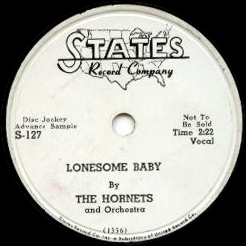
The Hornets: James "Sonny" Long (lead); Johnny Moore (tenor); Ben Iverson (baritone); Gus Miller (bass) with Al Smith (ldr); Red Holloway (ts -1); Horace Palm (p); Lefty Bates (eg); prob. Quinn Wilson (b); prob. Paul Gusman (d).
Universal Recording, Chicago, August 12, 1953
| 1356 | Lonesome Baby -1 | States 127, P-Vine Special [J] PLP-9036, Delmark DE-703 [CD], United U-163 [CD] | |
| 1357 | You Played the Game | P-Vine Special [J] PLP-9036, Delmark DE-703 [CD], United U-163 [CD] | |
| 1358 | Reelin' and Rockin'-1 | P-Vine Special [J] PLP-9036, Delmark DE-703 [CD], United U-163 [CD] | |
| 1359 | I Can't Believe | States 127, P-Vine Special [J] PLP-9036, Delmark DE-703 [CD], United U-163 [CD] | |
| 1360 | Big City Bound -1 | P-Vine Special [J] PLP-9036, Delmark DE-703 [CD], United U-163 [CD] |
The session details are from Bob Koester's United/States discography, Blues Unlimited,Jan/Feb 1977. There are no composer credits on the original labels to States 127. "Reelin' and Rockin'" was misrendered "Ridin' and Rockin'" there and in subsequent accounts, except in Robert Pruter's book, Doowop: The Chicago Scene, which is also the source for The Hornets' personnel. (Koester also rendered "Big City Bound" as "Big City Bounce.") United U-163 is a bootleg CD from 1999 titled Rare Windy City R&B: Vocal Groups From the Street-corners of Chicago Volume One.
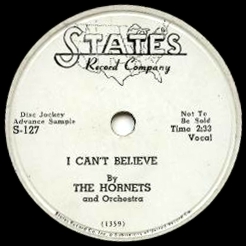
The instrumentalists were identified by ear; Al Smith was rehearsing vocal groups in his basement for United and States at this time, and the group sounds like a typical Al Smith lineup. States 127 is a hyper-rare single that was released in November 1953. The P-Vine Special LP was issued in Japan in 1981; its title was Black Music In The 50's: Chicago Doo-Wops: Five Cs vs. Hornets. Like some other P-Vines that had been licensed from Delmark, it preceded any correspoding issue on the parent label by many years. Delmark DE-703, The Dandeliers [sic]& Other Great Groups on States, was issued in 1997.
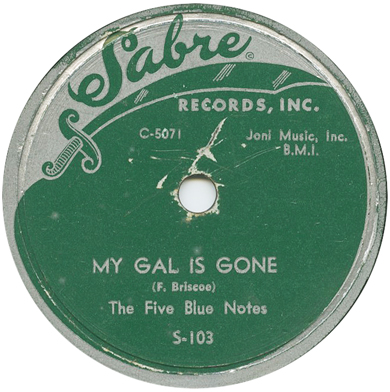
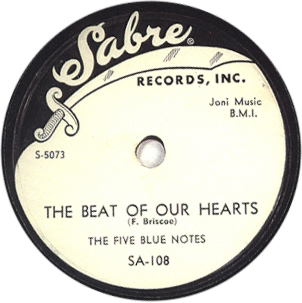
The Five Blue Notes: Andy Magruder (lead); Fleming Briscoe (lead, tenor); Jackie Shedrick (1st tenor); Robert Stroud (2nd tenor); Moise Vaughn (baritone / bass); with Al Smith (ldr); James "Red" Holloway (ts except -1); prob. Willie Jones (p except -2); prob. Quinn Wilson (b); Lefty Bates (eg); Paul Gusman (d).
Universal Recording, October 21, 1953
| C-5070 | Ooh Baby | Sabre S-103, Constellation CS 5, Famous Groove [F] FG.971016 [CD] | |
| C-5071 | My Gal Is Gone (Briscoe) -1 | Sabre S-103, Constellation CS 5, Famous Groove [F] FG.971016 [CD] | |
| S-5072 | You Gotta Go Baby | Sabre SA 108, Constellation CS 5, Famous Groove [F] FG.971016 [CD] | |
| S-5073 | The Beat of Our Hearts (Briscoe) -2 | Sabre SA 108, Constellation CS 5, Famous Groove [F] FG.971016 [CD] |
Sabre S-103 was a single (45 and 78 rpm) released in December 1953. Sabre SA 108 followed suit around June 1954. Constellation CS 5, an LP titled Groups Three, was issued in 1964. A bootleg reissue on CD (Famous Groove FG.971016) came out in 1997 under the title Groups Three Plus; it added the two "Wally Wilson" sides from the January 17, 1954 session (really, these are by Walter Spriggs and the Five Echoes) and items that the Five Blue Notes and the Five Chances recorded for other labels.
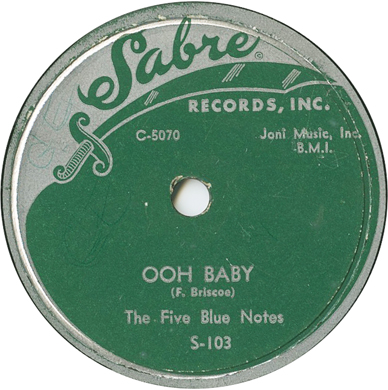
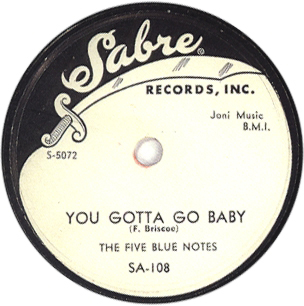
Robert Pruter, Doowop: The Chicago Scene, is the source for the personnel of The Five Blue Notes. Instrumentalists were identified by ear. The balance is unusual for an Al Smith band: guitar very much to the forefront, piano recessed (in fact, the piano is completely absent from "The Beat of Our Hearts," while prominent guitar chording takes its place). Paul Gusman uses brushes. Red Holloway has a tenor solo on "Ooh Baby" and another one on "I Got to Go, Baby." He is heard only on the final two bars of "The Beat of Our Hearts."
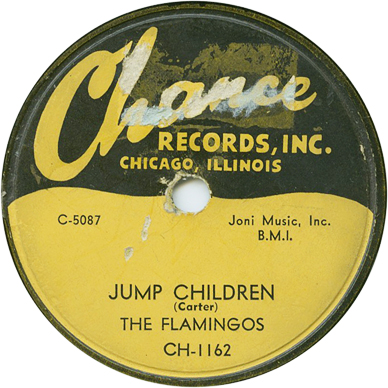
The Flamingos: Sollie McElroy, Zeke Carey, Jake Carey, Johnny Carter, Paul Wilson (voc); with Al Smith (ldr); Hobart Dotson (tp); Red Holloway (ts); McKinley Easton (bars); Horace Palm (celeste -1; p); Quinn Wilson (b); Vernel Fournier (d).
Universal Recording, Chicago, December 24, 1953
| C-5084 | Listen to My Plea | unissued | |
| C-5085 | Blues in a Letter (Carter) | Chance 1162, Constellation CS-3, Vee-Jay 706 [CD], Uggh 501 [CD] | |
| C-5086 | September Song -1 | Vee-Jay VJLP 1052, Constellation CS-3, Chance 1166 (boot), Chance 1131 (boot), Vee-Jay 706 [CD], Uggh 501 [CD] | |
| C-5087 | Jump Children (Carter) | Chance 1162, Constellation CS-3, Vee-Jay 706 [CD], Uggh 501 [CD] | |
| C-5087 [alt.] | Vooit Vooit [Jump Children] | Chance 1131 (boot) |
Chance 1162 was released in October 1954. Different "repros" of 1162 are in circulation. In addition, a repro with "Vooit Vooit" (an alternate take of "Jump Children") and "September Song" has circulated with the incorrect number Chance 1131 (meanwhile, the real Chance 1131 was a Homesick James Williamson recording). There is also a repro Chance 1166 that consists of this "September Song" with a flip side by The Moonglows.
Information on C-5084 and C-5086 from the Chauvard listing. Chauvard correctly has "Blues in a Letter" as C-5085 and "Jump Children" as C-5087, while some other sources reverse the numbers.
Personnel identified by ear by rlc, with corrections by Vernel Fournier. Fournier suggests that Hobart Dotson was on trumpet, not Sonny Cohn as we originally through. He confirms his own presence and says that Horace Palm (not Norman Simmons) was at the piano.
"Listen to My Plea" was remade at the next Flamingos session. "September Song" was first issued on Vee-Jay LP 1052 in 1962. Some sources have given U-5155 as its matrix number, but Chauvard identifies that as "Thank You for Your Kindness," an unreleased number by J. B. Hutto (from the very last Chance session that produced the very last Chance release, 1165).
Although the matrix numbers are contiguous, the band on this Flamingos session is clearly different from the band on the next Moonglows session.
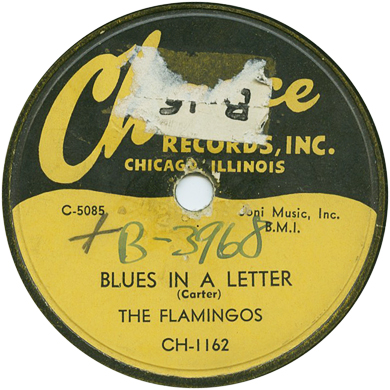
In 1954, Al Smith directed the band on 11 recording sessions that we know of. During the Winter and Spring, he was involved in 3 sessions for Chance. But as activity at Chance began to wind down, he and his musicians were invited to accompany vocalists and vocal groups at the fledgling Vee-Jay label. (Cutting 5 sessions, from June 30 through the end of the year, they handled nearly 1/5 of the tracks that Vee-Jay released). Al Smith also broke in with Parrot, which had previously relied on the bands of Paul Bascomb and Red Saunders to accompany singers; two sessions for Parrot made up for the lack of vocal group activity on the United/States front. Al did record two blues sessions for United/States in his basement (probably playing on one of them).
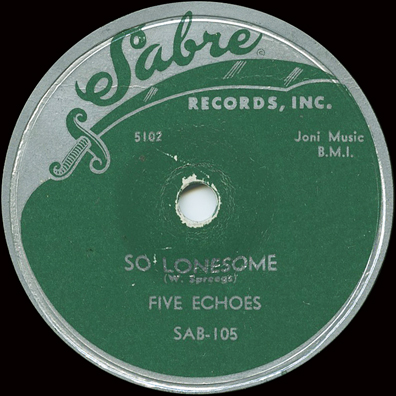
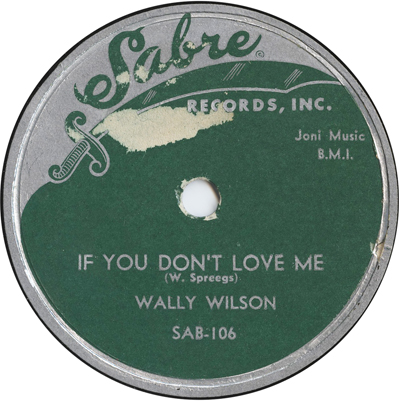
Walter Spriggs aka "Wally Wilson" (voc -1); with The Five Echoes (voc except -2): Earl Lewis (1st tenor); Johnnie Taylor (2nd tenor); Constant "Count" Sims (baritone); Herbert Lewis (baritone); Jimmy Marshall (bass); accompanied by Al Smith (ldr); Red Holloway (ts); McKinley Easton (bars); Willie Jones (p); Quinn Wilson (b); Lefty Bates (eg); Vernel Fournier (d).
Universal Recording, Chicago, January 17, 1954
| C5102 | So Lonesome (Spriggs) | Sabre SAB-105, Constellation CS-5, Famous Groove [F] FG.971016 [CD] | |
| C5103 | Broke (Spriggs) | Sabre SAB-105, Constellation CS-5, Famous Groove [F] FG.971016 [CD] | |
| C5104 | If You Don't Love Me (Spriggs) ^ -1 | Sabre S106, Famous Groove [F] FG.971016 [CD] | |
| C5105-9 | The Hunt (Spriggs) ^ -1 | Sabre S106, Famous Groove [F] FG.971016 [CD] | |
| C5105-10 | The Hunt (Spriggs) -2 | unissued |
Sabre S105 and S106 were 45 and 78 rpm singles, released in February and March 1954. Sabre S105 was reissued in 1964 on a Constellation LP CS-5, titled Groups Three. A bootleg reissue on CD (Famous Groove FG.971016) came out in 1997 under the title Groups Three Plus; it added the two "Wally Wilson" sides from this session and items that the Five Blue Notes and the Five Chances recorded for other labels.
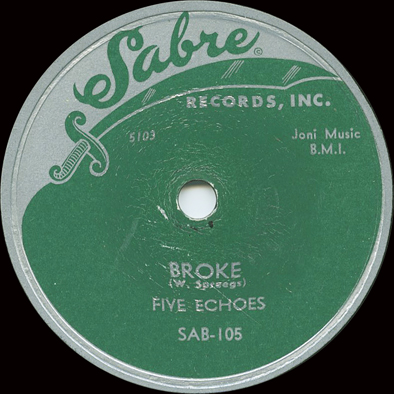
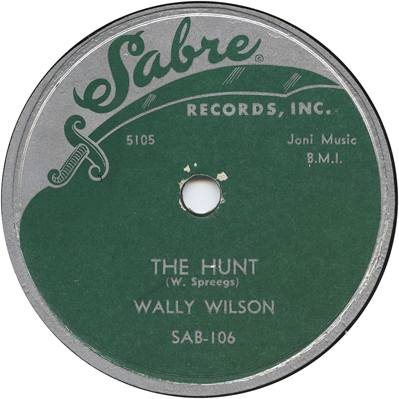
Walter Spriggs was a singer and songwriter who often collaborated with the Five Echoes but was never a regular member of the group. For years, "Wally Wilson" went unidentified, but the lead vocalist on both sides, a light tenor, is obviously Spriggs; compare his two sides he on Blue Lake 109, cut later the same year under his own name. All four sides from the session carry composer credits to "W. Spreegs" (for some reason, Chance and Sabre consistently misspelled his last name).
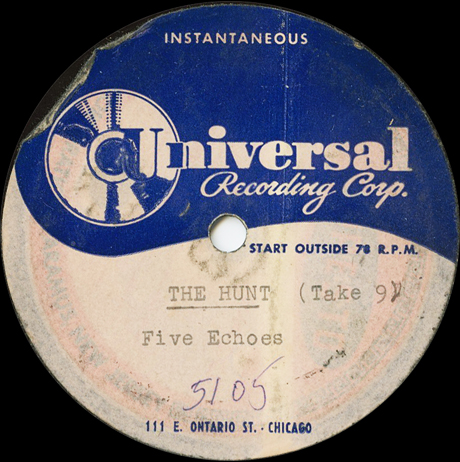
A previously unknown lacquer from Universal Recording contains takes 9 and 10 of "The Hunt." Take 9 was issued on Sabre; take 10 features Walter Spriggs' solo vocal and has never been issued.
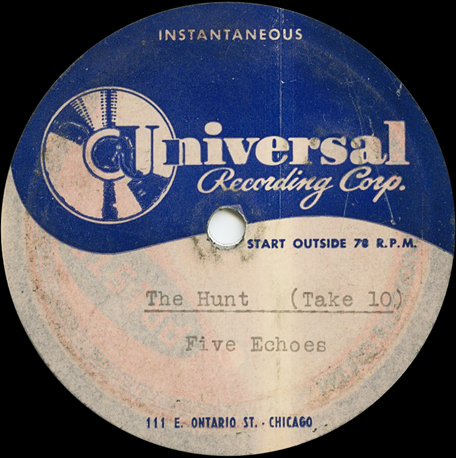
Personnel for the Five Echoes was supplied by Robert Pruter in Doowop: The Chicago Scene. Instrumentalists identified by ear. Red Holloway accompanies the stage sobbing on "So Lonesome" and has full-fledged solos on "Broke" and "The Hunt" (including take 10). Willie Jones prominently accompanies the latter solo, during which Spriggs shouts, "Go, Red, go!" On "If You Don't Love Me" Bates' guitar is to the forefront and the piano is barely audible.
The other four sides that the Five Echoes recorded for Chance used the band of Ike "Fats" Cole. Besides Cole's piano, they probably included Percy Payner on bass and Charlie Williams on drums, along with an unidentified tenor saxophonist.
The Five Echoes moved on to Vee-Jay where they would make another session with Al Smith around October 31, 1954 (see below).
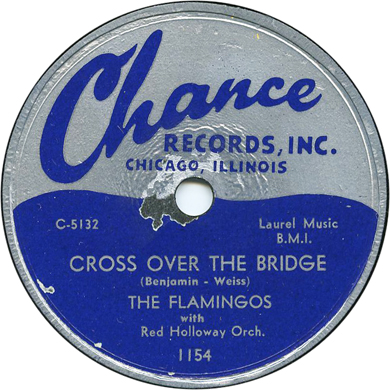
The Flamingos: Sollie McElroy, Zeke Carey, Jake Carey, Johnny Carter, Paul Wilson (voc); with Al Smith (ldr); Red Holloway (ts); McKinley Easton (bars); Willie Jones (p); prob. Quinn Wilson (b); Vernel Fournier (d).
Universal Recording, Chicago, February 17, 1954
| C-5132 | Cross over the Bridge (Benjamin-Weiss) | Chance 1154, Vee-Jay VJLP 1052, Constellation CS-3, Instant 5072 [CD] (UK), Vee-Jay 706 [CD], Uggh 501 [CD] | |
| C-5133 | Listen to My Plea (J. Carter) | Chance 1154, Constellation CS-3, Vee-Jay 706 [CD], Uggh 501 [CD] |
All personnel identifications by ear. Chance 1154 was released in March 1954. There is more than one kind of repro of this single. "Cross over the Bridge" and "Listen to My Plea" feature solos by Red Holloway and prominent accompaniments by Mac Easton. The piano comping beneath the tenor solo on "Listen to My Plea" sounds like Willie Jones.
Two out of the Flamingos' 9 sides from the Chance period with Red Holloway or Al Smith bands were also reissued in 1990 on Rhino CD 70967, The Best of the Flamingos. Details to be filled in.
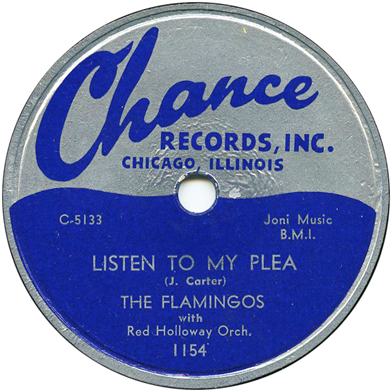
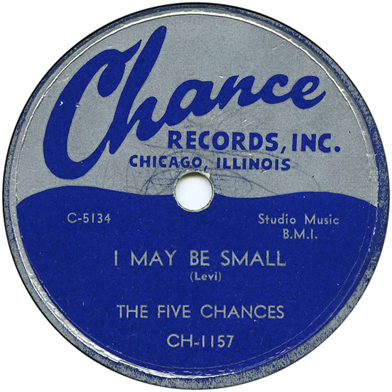
The Five Chances: Darnell Austell (lead); Eddie Stillwell (lead); Reggie Smith (tenor); Harold Jones (baritone/ tenor); Howard Pitman (baritone); John Austell (bass); with Al Smith (ldr); Red Holloway (ts); prob. Norman Simmons (p); Lefty Bates (eg); prob. Quinn Wilson (b); Vernel Fournier (d).
Universal Recording, Chicago, Spring 1954
| C-5134 | I May Be Small (Levi) | Chance 1157, Constellation CS-5, Famous Groove [F] FG.971016 [CD] | |
| C-5135 | California | Constellation CS-5, Famous Groove [F] FG.971016 [CD] | |
| C-5136 | Nagasaki (Warren-Dixon) | Chance 1157, Constellation CS-5, Famous Groove [F] FG.971016 [CD] | |
| C-5137 | Make Love to Me | Constellation CS-5, Famous Groove [F] FG.971016 [CD] |
Chance 1157 was a single (45 and 78 rpm) issued in August 1954. All four sides appeared on Constellation LP CS-5, Groups Three, in 1964. A bootleg reissue on CD (Famous Groove FG.971016) came out in 1997 under the title Groups Three Plus; it added the two Wally Wilson sides from this session and items that the Five Blue Notes and the Five Chances recorded for other labels.
The personnel of the Five Chances was provided by Robert Pruter in Doowop: The Chicago Scene. The instrumentalists were identified by ear. Red Holloway has a brief tag in the introduction to "I May Be Small," a solo on "California," and a solo on "Nagasaki." This last is really a bebop number: it opens with a "mop-mop" riff and the central portion is a devoutly Christian guitar solo by Lefty Bates, followed by a bebop solo by Red, followed by a second guitar solo.
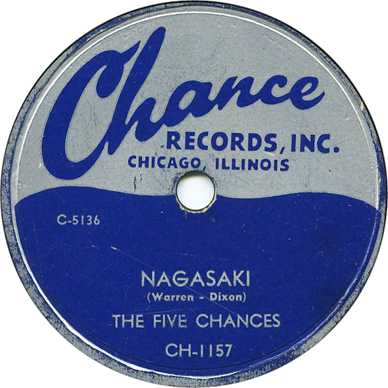
When Art Sheridan closed Chance in December 1954, its business manager Ewart Abner Jr. went over to Vee-Jay, which had started up in May 1953. To our knowledge, Al Smith did not make any Chance sessions after March or April 1954. Meanwhile, Vee-Jay, despite commercial successes from in its first few sessions, had little capital to invest and recorded sparsely during the first half of 1954. We learn from the Chicago Defender of May 15, 1954 that Al Smith and His Band were the featured attraction at the Club Evergreen. The accompanying write up, which refers to Al Smith and His All Stars, says "Al, back in the city from an extensive tour will be at the club for a limited engagement before going on the road again." Al Smith did his first work for Vee-Jay, at the end of June 1954, when the company mounted a marathon session at Universal Recording. He did not return to the studio for the fledging company (which recorded only 28 sides in 1953 and would be responsible for 100 in 1954) until September.
In 1953 and 1954, Sun Ra was a member of the Al Smith band for some period of time (Tommy Hunter, who left Chicago in 1953, and Red Holloway, who placed Sunny's time in the band in 1954, have both mentioned his presence). In a March 1997 interview with Armin Büttner and Otto Flückiger, Holloway implied that Sunny was responsible for the arrangements, to the extent that Smith's rather loose combo needed any. But Sunny has not been positively identified as the pianist on any Al Smith session.
Smith's club gigs were becoming more sporadic. However, his band was working at New Club Evergreen in May 1954 (indefinite contract filed on May 20). He posted a follow-up contract for one week at New Club Evergreen on June 17, along with a 3-week contract at Jewell's Lounge.
Al Smith ran the house band at Vee-Jay Records from mid-1954 until early 1959. Nearly all Vee-Jay recording sessions in Chicago took place at Universal Recording. (Later on, some items would issued on the Vee-Jay subsidiary Falcon, name subsequently changed to Abner.)
![The El Darados [sic],](veejay115eldararc.jpg)
The El Dorados: Pirkle Lee Moses, Jewel Jones, Louis Bradley, James Maddox, Arthur Bassett, Richard Nickens (voc); Al Smith (ldr); Red Holloway (ts); Horace Palm (p); Lefty Bates (eg); prob. Quinn Wilson (b); prob. Al Duncan (d).
Universal Recording, Chicago, June 30, 1954
| 54-162 | My Loving Baby (P. Moses - J. Moore) | Vee-Jay 115, Vee-Jay VJLP-1001, Solid Smoke LP 8025, Charly LP 1022, Vee-Jay CD 702, Collectables CD 7245 | |
| 54-163 | Baby I Need You (J. Moore-P. Moses) | Vee-Jay 115, Vee-Jay VJLP-1001, Charly LP 1022, Vee-Jay CD 702, Famous Groove FG.971001 [CD], Collectables CD 7245 |
Vee-Jay 115, a 78 and 45 rpm single, was released in August 1954. Early pressings of the 78 and the 45 misspell the name of the group. VJLP-1001 was an El Dorados/Magnificents collection released in 1957 under the title Crazy Little Mama. Oldies 45 OL58 was a 1963 release on a label that Vee-Jay set up for reissues. The song is titled "My Lovin' Baby" on the Oldies 45 but the composer credits are as on the original release and the name of the group is spelled correctly.
This was the El Dorados' first session with Vee-Jay; they had signed the contract with the label on June 1. Probably just two tunes were done because Vee-Jay, which had recorded very sparsely in the first half of 1954, was conducting a marathon in the studio on June 30.
![The El Darados [sic],](veejay115eldarbrc.jpg)
Our information about Al Smith as leader derives from the Mohr-Flückiger-Demeusy Files. There are no instrumental solos on either side but the other participants are readily identifiable by ear. Pirkle Lee Moses sings the lead on "My Loving Baby"; Arthur Bassett sings the lead on "Baby I Need You." Famous Groove FG 971001, Vee-Jay Doo Wop Volume 1: Oh What a Nite, was released in 1997. Collectables CD 7245, The Very Best of the El Dorados, is a 2000 release.
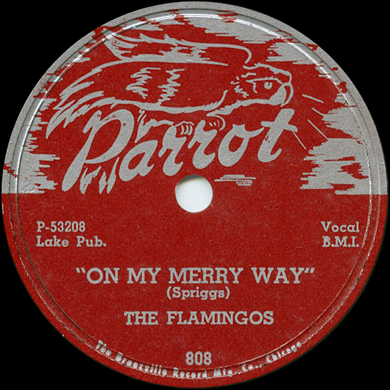
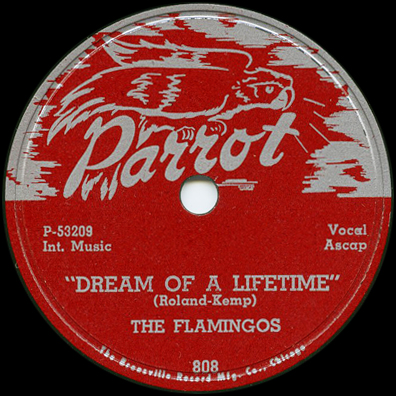
The Flamingos: Nate Nelson (lead); Johnny Carter (1st tenor, falsetto); Zeke Carey (2nd tenor); Paul Wilson (baritone); Jake Carey (bass); with Al Smith (b, ldr); Lucius "Little Wash" Washington or Cliff Davis (ts); poss. Willie Jones (celeste -1, p); Lefty Bates (eg); Paul Gusman (d).
Universal Recording, Chicago, c. July 1954
| P 53208 | On My Merry Way (Spriggs) | Parrot 808, Checker LP 1433, Chess ACRR-702, Relic CD 7053 | |
| P 53209 | Dream of a Lifetime (Roland-Kemp) -1 | Parrot 808, Checker LP 1433, Chess ACRR-702, Relic CD 7053 | |
| P 53209 [alt.] | Dream of a Lifetime -1 | Chess ACRR-702 | |
| P 53210 | If I Could Love You | Chess ACRR-702, Relic CD 7073 | |
| P 53211 | I Really Don't Want to Know (Whitely-Barnes) | Parrot 811, Chess ACRR-702, Relic CD 7053 |
Parrot 808 was a 78 and 45 rpm single released in August 1954. Parrot 811 was a 45 and 78 rpm single released in December 1954. Checker LP 1433, The Flamingos, was released in March 1959; Chess ACRR-702, an LP titled Flamingos, appeared in 1976 (see The Chess Story by Mike Callahan at http://www.bsnpubs.com/chesscheck.html.
Relic CD 7053 was a various-artists collection released in 1993 under the title The Golden Era of Doowops: The Groups of Parrot Records. Relic CD 7073, its companion volume, was released in 1994 as The Golden Era of Doowops: The Groups of Parrot/ Blue Lake Records.
Robert Pruter (in Doowop: The Chicago Scene) gives the lineup for the Flamingos. Instrumentalists identified by ear by rlc. For Willie Jones, check the piano intro and accompaniment on "Merry Way"; however, Red Holloway questioned whether Willie was playing such "open-knife chords." There is a tenor sax solo on "Merry Way." We thought the tenor player was Red Holloway, but after listening to the piece he believes that it was either Lucius Washington or Cliff Davis. There is a Charlie Parker lick in the solo that Red didn't use but that both Little Wash and Cliff Davis were in the habit of playing.
During their years at Checker, the Flamingos recorded a new version of "Dream of a Lifetime," which appeared on Checker 915. Same song, but faster tempo, piano instead of celeste, and more prominent guitar, among other differences. This is potentially confusing, given the Chess brothers' acquisition of the group's Parrot sides, several of which saw reissue with new matrix numbers.
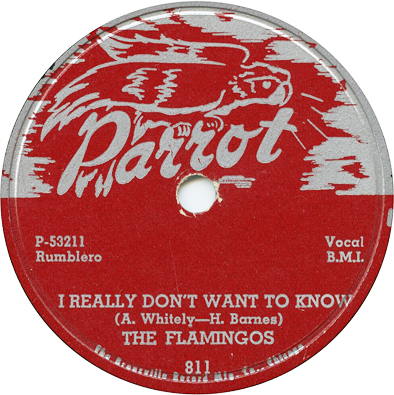
Al Smith's band continued at the Jewel Lounge (as it was now spelled), posting a contract for 5 weeks on July 15, and a follow-up for another month on September 2.
The next session was intended to feature a singer named Hazel McCollum. At the time she was married to Robert McCollum (better known as Robert Nighthawk).
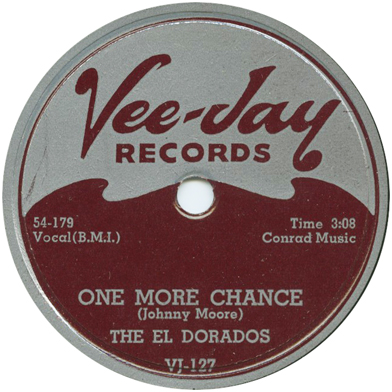
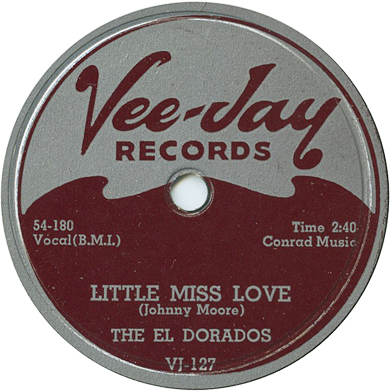
Al Smith (ldr); Harold Ashby (ts); McKinley Easton (bars); Horace Palm (p); Lefty Bates (eg); prob. Quinn Wilson (b); Oliver Coleman (d); Hazel McCollum (voc -1); The El Dorados: Pirkle Lee Moses, Jewel Jones, Louis Bradley, James Maddox, Arthur Bassett, Richard Nickens (voc -1, 2).
Universal Recording, Chicago, September 8, 1954
| 54-179 | One More Chance (Johnny Moore) -2 | Vee-Jay 127, Solid Smoke LP 8025, Vee-Jay CD 702, Collectables CD 7245 | |
| 54-180 | Little Miss Love (Johnny Moore) -2 | Vee-Jay 127, Oldies 45 OL91, Charly LP 1022, Vee-Jay CD 702, Collectables CD 7245 | |
| 54-181 | Annie's Answer % (A. Smith-B. Prince) ^ -1 | Vee-Jay 118, Vee-Jay VJLP-1001, Charly LP 1022, Vee-Jay CD 702, Collectables CD 7245 | |
| 54-182 | Livin' with Vivian (A. Smith)^ | Vee-Jay 118 |
Our information about the session comes from the MFD Files. Vee-Jay 118 was released on 78 and 45 rpm in November 1954. Vee-Jay 127 was talked up in Cash Box on February 26, 1955 (p. 28), advertised on March 5, 1955 (p. 24), and reviewed in Cash Box on April 2, 1955 (p. 67). Oldies 45 OL91, on a subsidiary of Vee-Jay that specialized in reissues, was released in January 1964. Solid Smoke LP 8025 was issued in 1984 as Low Mileage—High Octane. Collectables CD 7245, The Very Best of the El Dorados, is a 2000 release.
Our information about the original releases derives from Gribin and Schiff, Doo-Wop: The Forgotten Third of Rock 'n Roll. "Livin' with Vivian" is no doubt a reference to Vivian Carter, the V in Vee-Jay. "Annie's Answer" is an answer-song to the notorious "Work with Me Annie" and its equally notorious sequel "Annie Had a Baby" (big hits in 1954 by Hank Ballard and the Midnighters). Hazel McCollum assures us, "I ain't had no baby, I don't want no baby."
The MFD Files give the matrix numbers in correct sequence: "One More Chance [incorrectly titled 'One More Time']" (179), "Little Miss Love" (180), "Annie's Answer" (181) and "Livin' with Vivian" (182). Lord and other discographers previously got them wrong. In fact, other discographical listings are all incomplete or misleading: Jepsen says "McCollon," but Bruyninckx—and the label—spell the singer's name "McCollum." Bruyninckx alone mentions The El Dorados on "Annie's Answer" and he calls the group the "Al Smith Combo," as it was on the label of Vee-Jay 118, instead of "Al Smith and his Orchestra"; he mentions no reissues.
Lefty Bates gets a guitar solo on "Annie's Answer." "Livin' with Vivian" is a Count Basie-style instrumental, on which Horace Palm deftly imitates the master, but the main attraction is Mac Easton. Mac rarely got an extended solo opportunity on record; he makes the most of it on this tour de force.
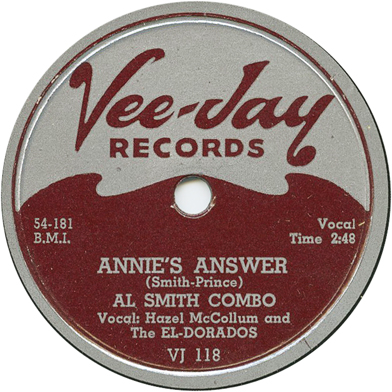
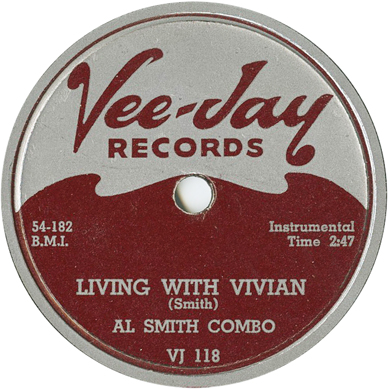
The Smith band picked up another month at the Jewel Lounge in October (contract posted with Local 208 on October 21).
Al Smith (b, ldr); McKinley Easton (bars); Horace Palm (p); Lefty Bates (eg); Vernel Fournier (d); Hazel McCollum (voc).
Universal Recording, Chicago, October 28, 1954
| unidentified titles | Vee-Jay (unissued) |
All information from Jepsen's Jazz Records. Jepsen seems to have been working from Vee-Jay company files.
One wonders whether Al really used just a baritone sax on this session.
Al Smith (b, ldr); McKinley Easton (bars); Horace Palm (p); Lefty Bates (eg); Vernel Fournier (d); Hazel McCollum (voc).
Universal Recording, Chicago, October 31, 1954
| unidentified titles | Vee-Jay (unissued) |
All information from Jepsen's Jazz Records. Same remarks as for the previous session.
Red Holloway has hinted that some Smith numbers had to be redone because of poor bass playing. It has been claimed that Smith ruined the November 30, 1953 session with Terry Timmons for United. Although not disastrous, the band's performance on these sides, and on the tracks by Ernest Kador, from the same day is sluggish and subpar. Could it be that these Vee-Jay sessions were spoiled as well?
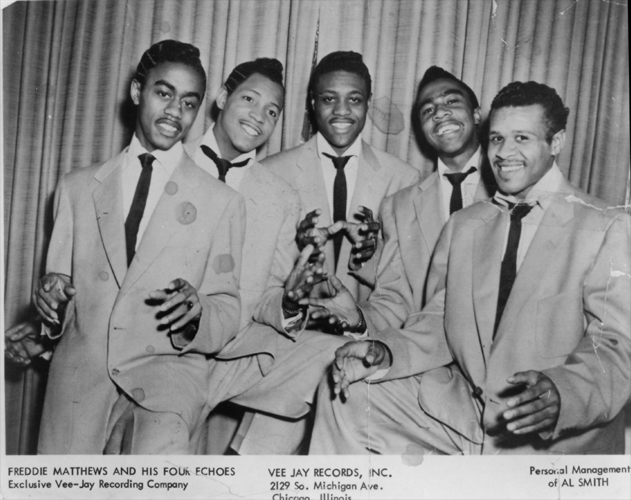
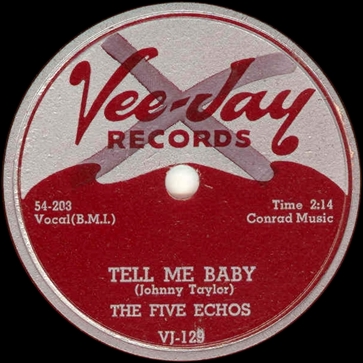
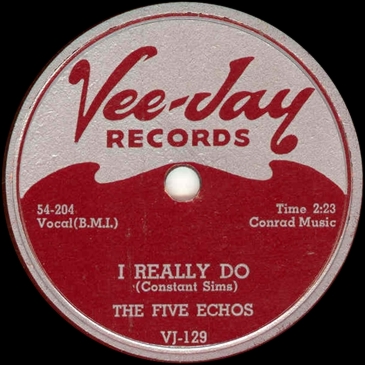
The Five Echoes: Earl Lewis (1st tenor); Johnnie Taylor (2nd tenor); Constant "Count" Sims (baritone); Herbert Lewis (baritone); Jimmy Marshall (bass); with Al Smith (ldr); Harold Ashby (ts); McKinley Easton (bars except -1); Horace Palm (p); Al Smith or Quinn Wilson (b); Lefty Bates (eg); Vernel Fournier (d).
Universal Recording, Chicago, prob. October 31, 1954
| 54-203 | Tell Me Baby | Vee-Jay 129 | |
| 54-203 [alt.] | Tell Me Baby -1 | Vee-Jay NVD2-715 [CD], Famous Groove CD FG.971002, P-Vine Special [J] PCD 5271/4, Famous Groove [F] FG.971016 [CD] | |
| 54-204 | I Really Do (Sims) | Vee-Jay 129 | |
| 54-204 [alt.] | I Really Do | Vee-Jay NVD2-709 [CD], Famous Groove CD FG.971002 | |
| 54-205 | Evil Woman | Vee-Jay NVD2-709 [CD], Famous Groove CD FG.971002, P-Vine Special [J] PCD 5271/4, Famous Groove [F] FG.971016 [CD] | |
| 54-206 | Fool's Prayer | Vee-Jay 156 | |
| 54-206 [alt.] | Fool's Prayer | Vee-Jay NVD2-715 [CD], Famous Groove CD FG.971002, Famous Groove [F] FG.971016 [CD] | |
| 54-207 | Tastee Freeze | Vee-Jay 156, Vee-Jay NVD2-715 [CD], Famous Groove CD FG.971002, Famous Groove [F] FG.971016 [CD] |
Vee-Jay 129 was a 78 and 45-rpm single released in March 1955. We'd previously given an earlier release date, but in Cash Box Vee-Jay 129 was being talked up on February 26, 1955 (p. 29), advertised on March 5 (p. 24), and reviewed on March 26 (p. 26). The company released two more sides from the session, though it felt no urgency in doing so. Vee-Jay 156 was out in October 1955; it was first advertised in Cash Box on November 5, 1955 (p. 28, along with 155, 144, and 159) and given a second "hypo" on November 19 (p. 35, along with 144 and 159).
Ferlingere's discography of vocal groups mentions that 129 and 156 have been "reproed" on the East Coast. The 45-rpm repros of Vee-Jay 129 and 156 use red vinyl.
Meanwhile, there was a Vee-Jay 190, but this was in reality a very rare release by tenor saxophonist Arnett Cobb. Vocal group "repros," available in both red and black vinyl, have been more recently labeled as Vee-Jay 190. These are misidentified as being by the Five Echoes, when in fact they by another vocal group entirely (originally known as the Echoes); the titles are "Soldier Boy" and "Down the Road I Go," which in some discographies are also incorrectly given the matrix numbers 54-202 and 54-205. Our thanks to Dr. Robert Stallworth for straightening out this mess for us. With the deletion of these two bogus titles, we get a 5-tune session consisting of nothing but genuine Five Echoes material.
In the 1990s, the original version of "Tastee Freeze," three alternate takes of sides that were released in the 1950s, and a previously unissued number ("Evil Woman") appeared on Vee-Jay NVD2-709 (A Taste of Doowop-Volume One) or Vee-Jay NVD2-715 (A Taste of Doowop-Volume Two), both of which were issued in 1993. The same five items were reissued on Famous Groove FG.971016 in 1997. P-Vine Special PCD 5271/4, Vee-Jay, The Chicago Black Music, is a 4-CD set issued in 2000.
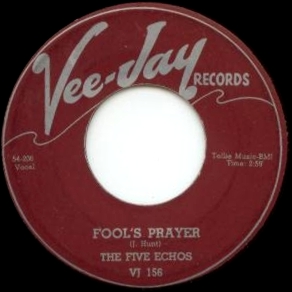
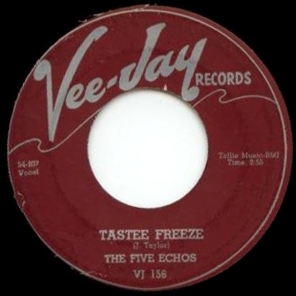
The personnel of the Five Echoes is drawn from Robert Pruter's book Doowop: The Chicago Scene. All instrumentalists were identified by ear. Harold Ashby has unmistakable tenor sax solos on "Evil Woman," "Tell Me Baby," "Fool's Prayer," and "Tastee Freeze," plus a brief tag at the end of "I Really Do." (Only the five takes that were issued in the 1990s have been heard.) Mac Easton gets no solos or prominent accompaniments on the material that we have heard (in fact, he lays out on "Tell Me Baby") but would have to be the default choice for this group anyway. Lefty Bates has guitar solos on "I Really Do" and "Tastee Freeze," and Vernel Fournier's drumming is clearly apparent. In all, the session shows off the Al Smith group with Harold Ashby to advantage; even Al's elementary bass playing is flattered by the recording process.
The precise session date is unknown, but 54-208 was recorded by the Dave Shipp Quintet on November 4, 1954. So it seems very likely that the Five Echoes numbers were recorded at the same sessions as the unsuccessful items with Hazel McCollum, or shortly thereafter.
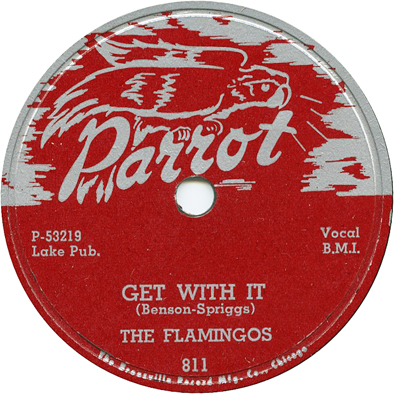
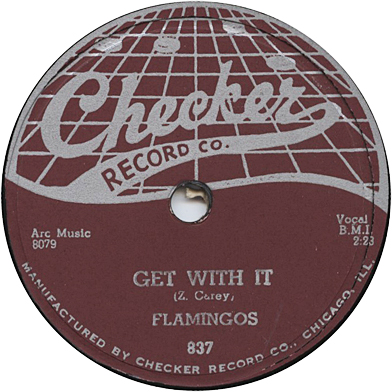
The Flamingos: Nate Nelson (lead); Johnny Carter (1st tenor, falsetto); Zeke Carey (2nd tenor); Paul Wilson (baritone); Jake Carey (bass); with Al Smith (ldr); prob. Sonny Cohn (tp -1); prob. Harlan "Booby" Floyd (tb -1); Red Holloway (ts); McKinley Easton (bars -1); Horace Palm (p -1, 3; org -2); prob. Quinn Wilson (b); Paul Gusman (d).
Universal Recording, Chicago, November 1954
| U 53218 (8004) |
I Found a New Baby -1 | Chess ACRR-702, Relic CD 7073 | |
| P 53219 (8079) |
Get with It (Benson-Spriggs) -1 | Parrot 811, Checker 837, Chess MCD 09378 [CD], Relic CD 7053 | |
| P-53220 | Ko Ko Mo (Forest-Haven) -2 | Parrot 812, Checker LP 1433, Chess ACRR-702, Relic CD 7073 | |
| P-53221 | I'm Yours (Mellin) -3 | Parrot 812, Relic CD 7073 |
Parrot 811 and 812 were 45 and 78 rpm singles, released in December 1954 and January 1955, respectively. Checker 837 was a single released in April 1956, according to Robert Ferlingere. The 7000 series matrix numbers were affixed by the Chess brothers when two of the sides were leased for issue on Checker. Chess MCD 09378 was a Flamingos compilation titled The Complete Chess Masters. It was released in 1987, with no date for "Get with It" and no acknowledgment that this track came from Parrot.
The vocal lineup for the Flamingos provided by Robert Pruter, Doowop: The Chicago Scene. The instrumental lineup was identified by ear by rlc.
"Ko Ko Mo" features a tenor saxophone solo by Red Holloway. "Get with It" and "I Found a New Baby" (not the 1920s tune) use the full horn section. "Get with It" also includes a long solo by Mac Easton, featuring several of his favorite corny quotes. The undistinguished organ playing on "Ko Ko Mo" (done in a mambo arrangement spotlighting Paul Gusman's drums) and the frequent use of redundant piano triplets elsewhere suggest that Horace Palm is present.
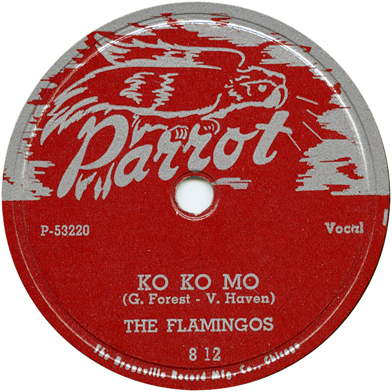
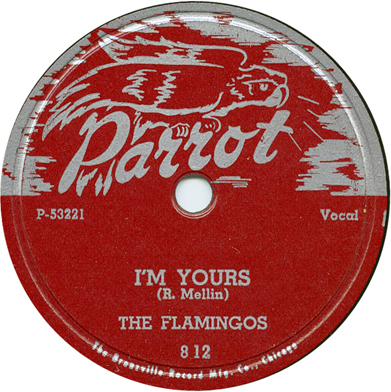
In December 1954, Al Smith used his basement at 5313 South Drexel (which he normally employed as a rehersal space) for two casual recording sessions. Leonard Allen of United Records was on hand; Allen took sufficient interest in the tapes to assign matrix numbers in its main series to the tracks on the first session. This first session featured Morris Pejoe (eg, voc); Stanley Grim (as); unidentified (ts); Henry Gray (p); Milton Rector (eb); and Earl Phillips (d). A second session, done around the same time, featured Delta blues guitarist Arthur "Big Boy" Spires and pianist Willie "Long Time" Smith. Since everyone on the date but Long Time Smith and the bassist was a member of Spires' working group, The Rocket Four, and the instrument appears to be a string bass, played in an undistinguished manner, we have a nominee...
Arthur "Big Boy" Spires (eg, voc); Willie "Big Eyes" Smith (hca); Willie "Long Time" Smith (p, voc); Edward El (eg); prob. Al Smith (b); Ted Porter (d).
Al Smith's basement, Chicago, prob. December 1954
| Dark and Stormy Night [BBS voc] | P-Vine Special [J] PLP-9040, Pearl PL-16, Delmark DD-716 [CD] | ||
| Moody This Morning [Grooving This Morning] [BBS voc] | P-Vine Special [J] PLP-9040*, Pearl PL-16, Delmark DD-716 [CD] | ||
| You Can't Tell [LTS voc] | P-Vine Special [J] PLP-9040, Pearl PL-16, Delmark DD-716 [CD] | ||
| Wrapped in My Baby [Rock with My Baby*] [LTS voc] | P-Vine Special [J] PLP-9040*, Pearl PL-16, Delmark DD-716 [CD] |
Although Leonard Allen was interested in this session and the tapes went into the United vaults, he never released anything from it. (Since it is a top quality blues session musically, we figure that he didn't want to put out material that wasn't up to his sonic standards.) This session (and its counterpart by Morris Pejoe) first appeared in Japan in 1982 on P-Vine Special PLP-9040, a compilation, mostly of United and States material, titled Chicago Blues in the Groove. This would not be the only occasion in the early 1980s when P-Vine beat Delmark to the punch with material licensed from Delmark. All four sides were subsequently released (with some corrections to the song titles) on a Pearl LP, Morris Pejoe / Arthur "Big Boy" Spires: Wrapped in My Baby, in 1989. Delmark DD-716 is a straight CD reissue of the LP from 1998.
In 1955, Al Smith was responsible for 15 sessions; he was active with Parrot and United as well as Vee-Jay. After a slow start in January through April, Vee-Jay cut around 150 sides in 1955; Al Smith's band appeared on about 15% of them. Al Smith also participated in his first big hit, "At My Front Door" by the El Dorados, which we are reasonably sure greatly increased his recording opportunities at Vee-Jay.
In January 1955, Al Smith took up a gig at the Crown Propeller Lounge (4 week contract accepted and filed on January 2). After that he would not reappear on the Local 208 contract list for several months, indicating perhaps that his band was spending some time on the road.
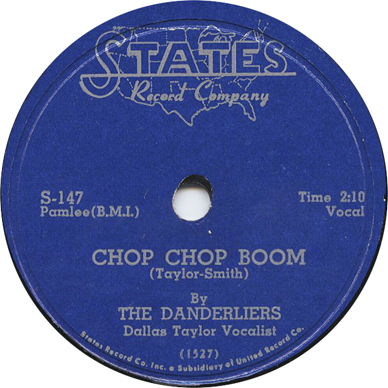
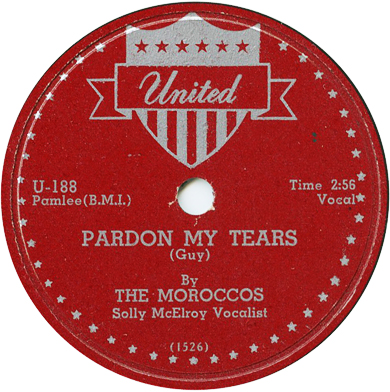
The Moroccos: Sollie McElroy (lead); Ralph Vernon (tenor); Melvin Morrow (tenor); George Kemp [George Prayer] (baritone); Fred Martin (bass); The Danderliers: Dallas Taylor (tenor and lead); James Campbell (tenor and lead); Bernard Dixon (tenor); Walter Stephenson (baritone); Richard Thomas (bass) with Al Smith (ldr); Red Holloway (ts); Norman Simmons (p -1; celeste -2); Lefty Bates (eg); prob. Quinn Wilson (b); Paul Gusman (d).
Universal Recording, Chicago, January 18, 1955
| 1525 | Red Hots and Chili Mac (T. Von Rush - A. Smith) [M voc] | unissued | |
| 1526 | Pardon My Tears (J. Guy) [M voc] | United 188, United U-143 [CD], Delmark DE-761 [CD] | |
| 1527 | Chop Chop Boom (Taylor-Smith) [D voc] -1 | States 147, B&F 1344, Delmark DE-703, United U-163 [CD], SHM9090 [CD] | |
| 1528 | My Autumn Love (Taylor) [D voc] -1, 2 | States 147, B&F 1344, Delmark DE-703, United U-163 [CD] | |
| 1529 | Chicken ("A. Smith - S. Smith") [M voc] | United 188, United U-143 [CD], Delmark DE-761 [CD] |
States 147 and United 188 were both released in March 1955.
United U-143, Rare Windy City R&B Vocal Groups From the street-corners of Chicago Volume Two, is a bootleg CD from 1999. The liners give January 1955 as the date for this session (we have previously interpolated it as February of that year). United U-163 is a companion issue, titled Rare Windy City R&B Vocal Groups From the street-corners of Chicago Volume One. SHM9090 is a various-artists CD release from 2000 titled Doo-Wopp for Dummies Volume 2. All of the tracks have nonsense syllables in the title (e.g., "Boyee Yoing" by the Marvellos).
Red Holloway is prominent on both Danderliers sides; his true solo time on "My Autumn Love" is very brief, but he interweaves constantly with the vocals. The other instrumentalists were identified by ear. There are no solos on "Pardon My Tears" or "Chicken." The exuberant drumming on "Chicken" might be the work of Vernel Fournier instead of Paul Gusman, but they are sometimes difficult to tell apart.
The Moroccos (minus Sollie McElroy) had previously recorded for United as the Four Chimes, on October 5, 1954. Leonard Allen wasn't satisfied with the two sides they cut, and the agreed-on solution was to add a new lead singer before trying again. The other two sides from the same session (also unissued) were done by a vocal group called the Dewtones. None of this material was released until recently. The accompaniment on the October 5, 1954 session (piano, electric guitar, bass, and drums) doesn't sound like the work of an Al Smith group; it might have been done by a Prince Cooper's trio plus a drummer.
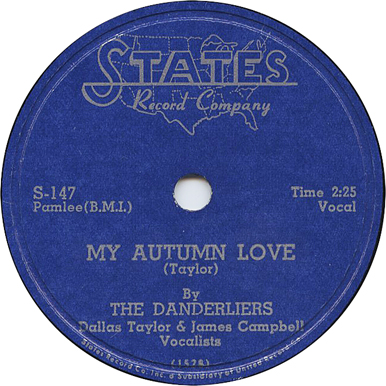
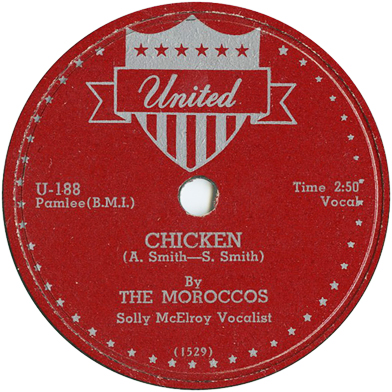
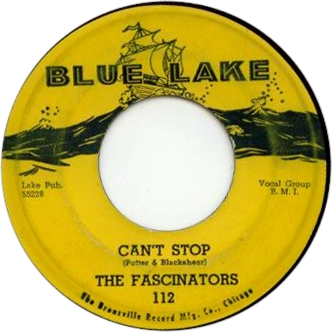
The Fascinators: Clarence Smith (1st tenor); Jerry Potter (2nd tenor); Earl Richardson (baritone/tenor); Donald Blackshear (baritone); Bob Rivers (bass); with prob. Al Smith (ldr); Red Holloway (ts); Willie Jones (p); prob. Quinn Wilson (b); Vernel Fournier (d).
Universal Recording, Chicago, March 14, 1955
| BL-55228 | Can't Stop (Potter-Blackshear) | Blue Lake 112, Relic CD 7073 | |
| BL-55229 | Don't Give My Love Away (Potter-Blackshear) | Blue Lake 112, Relic CD 7073 | |
| P 55230 | My Beauty, My Own | unissued | |
| ? | But I'll Remember | unissued |
Blue Lake 112 was a 78 and 45-rpm single released in May 1955. Jerry Potter of the Fascinators told Robert Pruter that he recalled doing the session (at Universal Recording, Studio A) in the early fall of 1954. Interpolation in the Parrot matrix series gives us a recording date around April of 1955. And on the c. 1959 list of Parrot and Blue Lake master tapes leased to Chess, three titles by the Fascinators are said to be in the same tape box as sides by bluesman J. B. Lenoir that were recorded on March 14, 1955. The matrix number for "My Beauty, My Own" also comes from the Chess tape list, which does not mention the fourth title from this session; it could be that Al Benson rejected it.
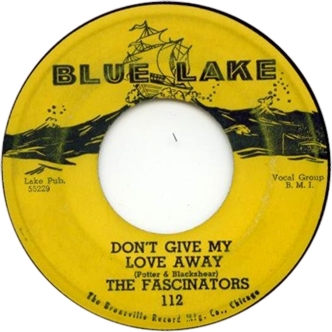
We got the personnel of The Fascinators from Robert Pruter, Doowop: The Chicago Scene. Instrumentalists were identified by ear. The two unissued sides are as recollected by Jerry Potter; one of them is confirmed by the Chess list of Parrot tapes.
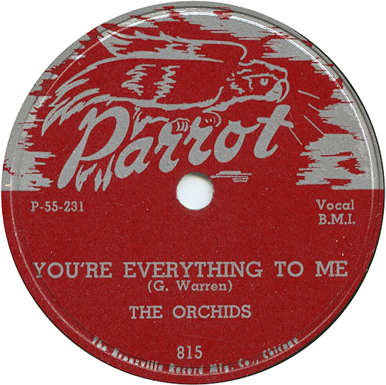
The Orchids: Gilbert Warren (lead, 1st tenor); Robert C. Nesbary (2nd tenor); Buford Wright (bass); "Charles" (baritone); with Al Smith (ldr); Red Holloway (ts); prob. Norman Simmons (p); Lefty Bates (eg); prob. Quinn Wilson (b); Vernel Fournier (d).
Universal Recording, Chicago, c. April 1955
| P 55231 | You're Everything to Me (Warren) | Parrot 815, Vee-Jay NVD2-709, Relic CD 7053 | |
| P 55232 | Newly Wed (Wright) | Parrot 815, Vee-Jay NVD2-709, Relic CD 7053 | |
| P 55232 [tk. 3] | Newly Wed | Relic CD 7073 | |
| P 55232 [tk. 8] | Newly Wed | Relic CD 7053 | |
| P 55233 | Hey Miss Fine | Vee-Jay NVD2-709, Relic CD 7053 | |
| P 55234 | Fine Sweet Woman | Vee-Jay NVD2-709, Relic CD 7053 |
Parrot 815 was a single (45 and 78 rpm) released on June 10, 1955. The tape box number for this session on the list of Parrot tapes in the Chess vaults, c. 1959, is 3283, while the Fascinators session (from March 14) is 3168 and the Five Chances/Lou Mac session (late May) is 3384. So a date in April 1955 is indicated.
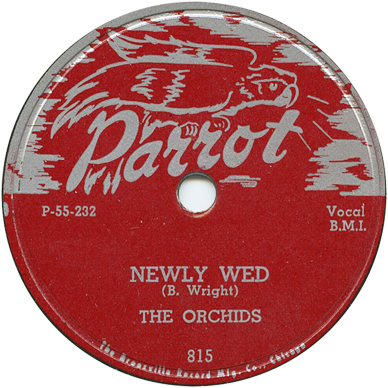
We used to think the last two tracks were recorded at the second Orchids session in September, but the tape list includes P 55233 "Please Don't Leave Me" and P 55234 "Fine Sweet Woman" on the April session. While "Please Don't Leave Me" is hardly a unique title for a doowop record, we note that each verse of "Hey Miss Fine" ends: "Please don't leave me, no, no, no, no, no." Of course, the tape list also puts P 55231 on "Newly Wed" and P 55232 on "You're Everything to Me," reversing the numbers that appear on Parrot 815. So there are loose ends to tie up still.
Vee-Jay NVD2-709 was a various-artists compilation released in 1993 under the title A Taste of Doo Wop, Volume 1. On it the unissued sides are given the same names that they had in the Chess brothers' inventory of Parrot tapes, so "Hey Miss Fine" is titled "Please Don't Leave Me." How the tapes of the Orchids' two sessions ended up with Vee-Jay tapes is an unsolved mystery, but it was only after the sides surfaced on the Vee-Jay reissue that the Orchids' tapes were reacquired by Relic. Relic CD 7053 was a various-artists collection released later in 1993 under the title The Golden Era of Doowops: The Groups of Parrot Records. Relic CD 7073, its companion volume, was released in 1994 as The Golden Era of Doowops: The Groups of Parrot/ Blue Lake Records.
Robert Pruter (in Doowop: The Chicago Scene) identified the Orchids. The instrumentalists were identified by ear by rlc. Red Holloway is obvious and is well featured on these sides.
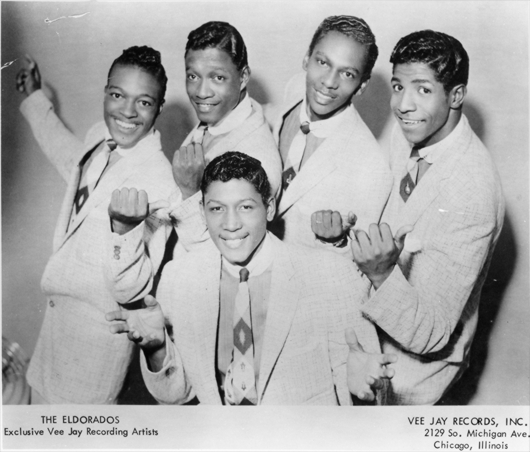
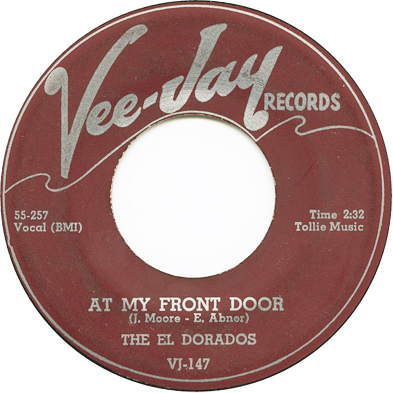
Al Smith (ldr); Sonny Cohn (tp); Harlan "Booby" Floyd (tb -1); Riley Hampton (as, arr -1); Red Holloway (ts); McKinley Easton (bars); Norman Simmons (celeste -3, p); prob. Quinn Wilson (b); Vernel Fournier (d); Hazel McCollum (voc -1); The El Dorados: Pirkle Lee Moses, Jewel Jones, Louis Bradley, James Maddox, Richard Nickens (voc -2).
Universal Recording, Chicago, April 24, 1955
| 55-252 | Boots Up -1 | Vee-Jay (unissued) | |
| 55-253 | Jump Up -1 | unissued | |
| 55-254 | Just like I Like It [HM voc] -1 | unissued | |
| 55-255 | Lovin' Time [HM voc] -1 | unissued | |
| 55-256 | I Began to Realize (J. Moore)^ [no horns] -2, 3 | Vee-Jay 165^, Vee-Jay VJLP-1001, Solid Smoke LP 8025, Charly LP 1022, Vee-Jay CD 702, Collectables CD 7245 | |
| 55-257 | At My Front Door (J. Moore-"Abner") % -2 | Vee-Jay 147%, Vee-Jay VJLP-1001, Oldies 45 OL22, Solid Smoke LP 8025, Charly LP 1022, Vee-Jay CD 702, Vee-Jay CD 715, Collectables CD 7204, Collectables CD 7245 |
All information about the instrumentals and the Hazel McCollum vocals from Jepsen's Jazz Records. Apparently the prinicipals at Vee-Jay weren't too happy with her singing, as only "Annie's Answer" from her first session ever saw release. Jepsen renders the title of 55-253 as "Jump Vip," but the Vee-Jay Master Book supplies the more sensible "Jump Up" (thanks to Big Joe Louis for this correction). Session information on the El Dorados portion from the MFD Files. The vocal lineup from Doowop: The Chicago Scene.
Vee-Jay 147 was relesed in July 1955. On July 30 (p. 21), 147 was advertised in Cash Box along with Morris Pejoe's 148 and Eddie Taylor's 149. An ad on August 6 (p. 24) paired it just with 148. Cash Box didn't review it till September 17 (p. 28). When Abner talked it up again on September 24, the record seemed to be drafting on 154 by The Spaniels, though now he was ready to venture that 147 "will be even bigger" (Cash Box, p. 27). "Front Door" pushed the El Dorados to national success when it hit #1 and lasted 18 weeks on Billboard's r&b chart. The record was a big pop hit as well, going to #17. By September 24, Vee-Jay was advertising the record as a pop hit (Cash Box, p. 26).
Vee-Jay 165 was a single released in November 1955. It was mentioned in Cash Box on November 26 (p. 35) and advertised on the same date (p. 38). A bigger ad followed on December 3 (p. 32).
Oldies 45 OL22, on a Vee-Jay subsidiary specializing in reissues, was released in 1963. Here the title was "Crazy Little Mama (At My Front Door)" and it was attributed to "El Dorados & Magnificents" (the latter vocal group was nowhere in evidence). Much later on, "At My Front Door" reappeared on a Vee-Jay CD 715, A Taste of Doowop Volume Two, in 1993. A sonically poor dubbing was included in the El Dorados' reissue CD 702 Bim Bam Boom, issued in 1992. Collectables CD 7204, Vee-Jay Rhythm & Blues: The Early Years Part One, and Collectables CD 7245, The Very Best of the El Dorados, are releases from 2000.
Red Holloway has a short tenor sax break on "At My Front Door," and there is a concluding vamp by Red and Norman Simmons.
Riley Hampton was now on board as a house arranger, though it appears that he became more active as the 50s wore on (he became the house band leader at Vee-Jay in 1959, and also did a lot of work for Chess in the early 1960s).
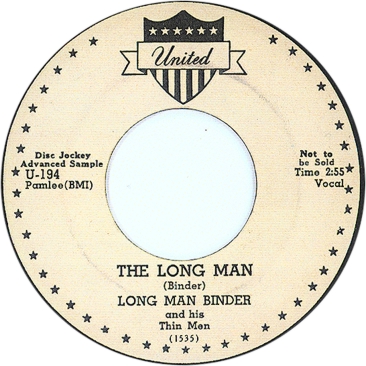
The Drakes: Tom Daniel (lead/tenor); Robert Anderson (tenor); Lincoln Mabins (baritone); William Anderson (baritone); Ira Anderson (bass); Dennis "Long Man" Binder (voc, p); with Al Smith (b, ldr); Raymond Hill (ts); Bobby Fields (ts); Vincent "Guitar Red" Duling (eg); Bob Prindell (d).
Universal Recording, Chicago, May 12, 1955
| 1533-16 | Mellow Daddy [D voc] | Delmark DE-703 [CD] | |
| 1534 | Just a Dream [D voc] | Delmark DE-703 [CD] | |
| 1535-8 | The Long Man (Binder) [DB voc] | United 194, Pearl PL-17, Delmark DE-717 [CD] | |
| 1536-2 | Feel So Good (Binder) [DB voc] | Pearl PL-17, Delmark DE-717 [CD] | |
| 1537-1 | I'm a Lover (Binder) [DB voc] | Delmark DE-717 [CD] | |
| 1537-12 | I'm a Lover (Binder) [DB voc] | United 194, P-Vine Special [J] PLP 9045, Pearl PL-17, Delmark DE-717 [CD] |
United 194 by Long Man Binder was released in October 1955; it got its first mention in Cash Box on November 5, 1955 (p. 27). The other sides by Dennis Binder, along with both by the Drakes, remained unreleased while United and States were in business. Basic data on this session are from Bob Koester's United/States discography; the take numbers were supplied by the recent Delmark CDs.
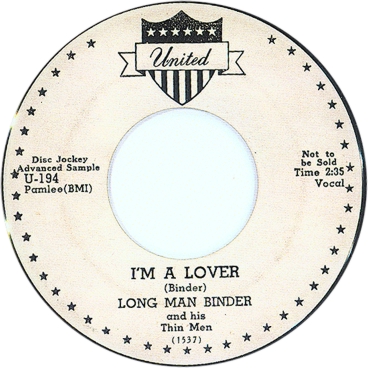
All three Dennis Binder tracks from this session were reissed on Pearl PL-17, Long Man Blues, an LP that appeared in 1989. (It also included material by Cliff Butler, Edward "Gates" White, and Lefty Bates with Arbee Stidham.) Delmark DE-717 [CD], also titled Long Man Blues, is a 2000 release that includes all of the material from Pearl PL-17, along with a second take of "I'm a Lover" and material by other artists. One track was reissued on P-Vine Special PLP 9045, a Japanese compilation that also included material by Ernest Kador, Grant Jones, and others, in 1982.
The Drakes material was issued for the first time in 1997 on Delmark DE-703, The Dandeliers [sic]& Other Great Groups on States. Our personnel for the Drakes is derived from Robert Pruter's interview with Tom Daniel, December 6, 2003.
The instrumental personnel comes from the liners to Pearl PL-17. This is not Al Smith's usual studio lineup; most of the musicans were "Long Man" Binder's regular accompanists. "Guitar Red" has an intense solo on "I'm a Lover." There is a piano in the group, even though it is not salient and was not credited on the Pearl release; our conclusion is that Binder played it himself.
The next session that Smith et al. did for Blue Lake, behind the Five Chances, Lou Mac, and the Palms, appears to use the exact same instrumental lineup as the Fascinators session did in March. However, Al Smith and company were not Al Benson's first choice. It was blues pianist Bob Call who was asked to accompany the Five Chances and Lou Mac on a session that took place on May 4, 1955. One trace of this: Call shared the composer credit on Lou Mac's "Baby." Call brought in a group with Johnny Griffin (tenor sax), Lee Cooper (guitar), Truck Parham (bass), and Richard Barnett (drums) but the session was a complete debacle. Al Benson rejected every track recorded that day, and he refused to pay Call for his work on it. Call filed a claim against Benson with Musicians Union Local 208 and the matter was thrashed out over two meetings of the Local 208 Board (May 19 and June 2, 1955). (The vocalists were not named in the proceedings, but it was made clear that Call's band was going to accompany one group of vocalists for 2 tracks and a different group for another two.) So Benson put together another session in late May (judging from the tape box numbers on the 1959 list of Parrot master tapes) to remake all four tracks, and this time he used an Al Smith group.
This session was probably done the same week as the Danderliers/Moroccos outing for United/States, when the Al Smith group hit one of its peaks. The catchy uptempo numbers ("Shake-a-Link" by the Five Chances and "Red Hots and Chili Mac" by the Moroccos) are particularly remarkable, but there is strong playing throughout.
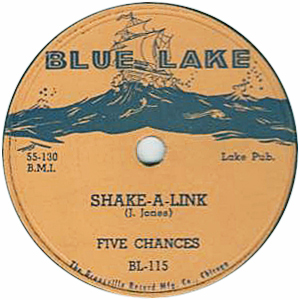
The Five Chances: Johnny "Chubby" Jones (tenor, lead), Darnell Austell (lead), Reggie Smith, Howard Pitman, Harold Jones (voc); Lou Mac [Lou McClinton] (voc) with the Palms: Wilbur Williams (lead); Murrie Eskridge (1st tenor); O. C. Perkins (2nd tenor); Willie Young; M. C. Ward (voc); accompanied by Al Smith (ldr); Red Holloway (ts); Willie Jones (p); Quinn Wilson (b); Vernel Fournier (d).
Universal Recording, Chicago, late May 1955
| 55-129 | All I Want ("Five Chances") [FC voc] | Blue Lake 115, Relic CD 7073 | |
| 55-130 | Shake-a-Link (Jones) [FC voc] | Blue Lake 115, Relic CD 7073 | |
| BL-55131 [55129 on label] |
Slow Down (McClinton-Call) [LM, P voc] | Blue Lake 114, Relic CD 7027, Relic CD 7073 | |
| BL-55132 [55130 on label] |
Baby (McClinton-Call) [LM voc] | Blue Lake 114 |
Blue Lake 115 was a single released in August 1955. Blue Lake 114 appeared in July 1955.
Although credited to the Five Chances on the label, "All I Want" isn't likely to be their song because it was first recorded for Parrot back in October 1953, by the Five Thrills with a Paul Bascomb-led group.Relic CD 7027 was a a various-artists collection released in 1992 as Rockin' at Midnight at the Parrot Club. Relic CD 7053 was a various-artists collection released in 1993 under the title The Golden Era of Doowops: The Groups of Parrot Records. Relic CD 7073, its companion volume, was released in 1994 as The Golden Era of Doowops: The Groups of Parrot/ Blue Lake Records.
There was some obvious confusion over the matrix numbers from this session; the labels of Blue Lake 114 disagree with what was engraved in the vinyl.
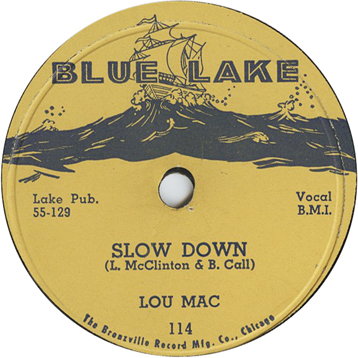
Personnel for the Five Chances and the Palms is taken from from Robert Pruter's Doowop: The Chicago Scene. The instrumentalists were identified by ear by rlc, with corrections by Vernel Fournier. Fournier confirmed that he was on drums; he identified the bassist as Quinn Wilson. Fournier also believed that the tenor saxophonist was Little Wash, but because the similarity between the playing here and Red Holloway's work on other sessions from this period, we have stuck with Red as the tenor player. There were just two sides by each artist and the backing is identical; the 1959 tape list confirms that all four were done at the same same session.
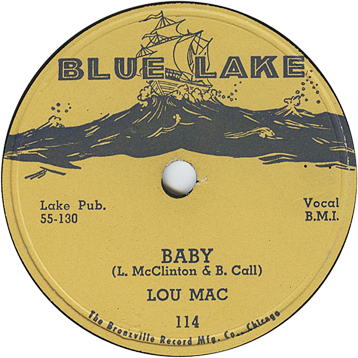
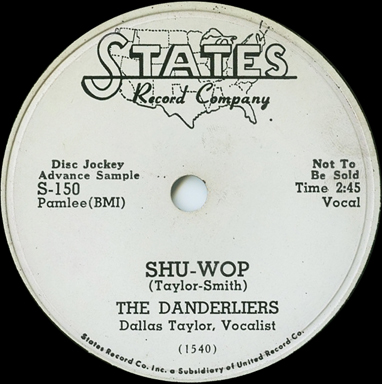
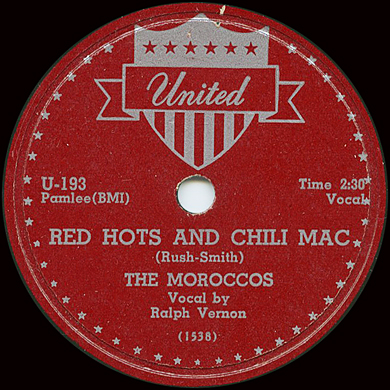
The Moroccos: Sollie McElroy (lead); Ralph Vernon (tenor); Melvin Morrow (tenor); George Kemp [George Prayer] (baritone); Fred Martin (bass); The Danderliers: Dallas Taylor (tenor and lead); James Campbell (tenor and lead); Bernard Dixon (tenor); Walter Stephenson (baritone); Richard Thomas (bass); with Al Smith (ldr); Red Holloway (ts); prob. McKinley Easton (bars except -1); Norman Simmons (p); Lefty Bates (eg); prob. Quinn Wilson (b); prob. Paul Gusman (d).
Universal Recording, Chicago, May 27, 1955
| 1538-10 | Red Hots and Chili Mac (T. Von Rush - A. Smith) [M voc] | United 193, United U-143 [CD], Delmark DE-761 [CD] | |
| 1539 | Morocco Chant [M voc] | Delmark DE-761 [CD] | |
| 1540 | Shu-Wop (Taylor-Smith) [D voc] | States 150, Delmark DE-703 [CD], United U-163 [CD] | |
| 1541 | My Loving Partner (Cox-Smith) [D voc] | States 150, Delmark DE-703 [CD], United U-163 [CD] | |
| 1542-4 | Somewhere over the Rainbow (Arlen-Harburg) [M voc] -1 | United 193, United U-143 [CD], Delmark DE-761 [CD] |
United 193 was released in October 1955; States 150 was released during the second half of 1955. United U-163 is a bootleg CD from 1999 titled Rare Windy City R&B Vocal Groups From the street-corners of Chicago Volume One. United U-143 is a bootleg CD, issued in 1999 under the title Rare Windy City R&B Vocal Groups From the street-corners of Chicago Volume Two.
Lefty Bates has a long solo on "Shu-Wop." There is a tenor saxophone solo (with prominent guitar accompaniment) on "Loving Partner." Red is prominent in the accompaniment of "Somewhere over the Rainbow." There are no solos on "Red Hots and Chili Mac," but the ensemble is just about perfect rhythmically.
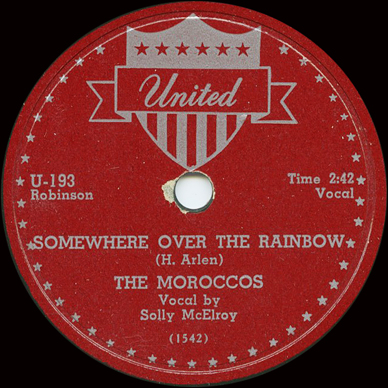
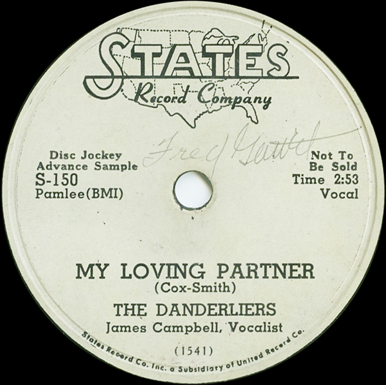
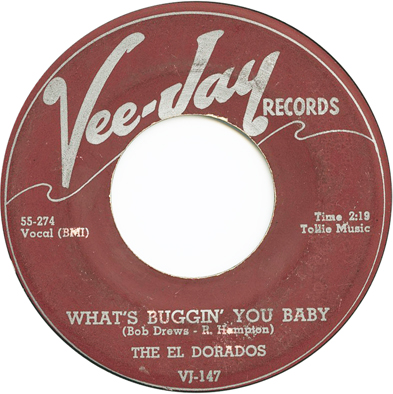
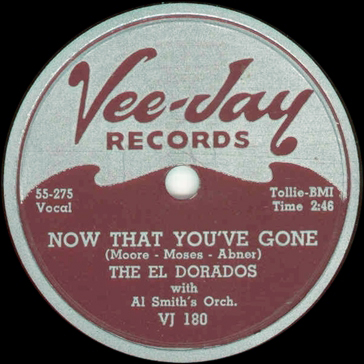
The El Dorados: Pirkle Lee Moses, Jewel Jones, Louis Bradley, James Maddox, Richard Nickens (voc -1) and The Knights of Rhythm -2: Leon Arnold (lead voc); John Gillespie (alto voc), George Vinyard (first tenor); David Hargrove (second tenor); Lester Martin (bass voc) with the Al Smith Orchestra: Al Smith (ldr); Red Holloway (ts except -3); Lefty Bates (eg); Norman Simmons (p); prob. Quinn Wilson (b); Vernel Fournier (d).
Universal Recording, Chicago, June 8, 1955
| 55-274 | What's Buggin' You Baby (Bob Drews-Riley Hampton) -1 | Vee-Jay 147, Oldies 45 OL22, Famous Groove FG 971010 [CD], Collectables CD 7245 | |
| 55-275 | Now That You've Gone (J. Moore-P. Moses-E. Abner) -1, 3 | Vee-Jay 180, Vee-Jay LP 1001, Solid Smoke LP 8025, Charly LP 1022, Vee-Jay NVD2-702, Collectables CD 7245 | |
| 55-276 | Forever Loving You (Arnold) -2 | unissued | |
| 55-277 | Lorrie -2 | unissued |
Vee-Jay 147 was released in June 1955; Vee-Jay 180 followed suit in February 1956, according to Robert Ferlinggere. Information on the El Dorados portion of this session comes from MFD Files and Doowop: The Chicago Scene. It turns out that the 78 rpm labels for Vee-Jay 147 misrendered Bob Drews, one of the composers of "What's Buggin'," as Bob "Owens." The 45 rpm labels got it right. "Now that You've Gone" appeared on Vee-Jay LP 1001, Crazy Little Mama by the El Dorados and the Magnificents, released in 1957. Oldies 45 OL22, on a later Vee-Jay spinoff for reissues, was released in 1963. It gives the title as "What's Bugging You Baby" and the composers as R. Hampton and B. Drews. The performance is attributed to "El Dorados & Magnificents," even though both sides of OL22 are the by El Dorados. Someone was being too reliant on the 1957 LP… Famous Groove FG 971010 is a doo-wop collection CD titled Vee Jay Doo Wop Volume 3: A Long Time Ago. It was released in late 1997. Collectables CD 7245, The Very Best of the El Dorados, is a release from 2000.
Information on the Knights of Rhythm is from the MFD Files, except for the vocal lineup, which is from Doowop: The Chicago Scene. This same "Forever Loving You" was taken over later by the El Dorados, who had a big hit with it. When this happened the Knights promptly left Vee-Jay and changed their name to the Rip-Chords, under which name they made a record for Abco (the predecessor to Cobra).
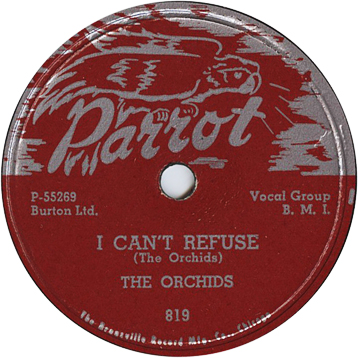
The Orchids: Gilbert Warren (lead, 1st tenor); Robert C. Nesbary (2nd tenor); Buford Wright (bass); Ashley Farr; Hubert White; with Al Smith (ldr); Red Holloway (ts); Willie Jones (celeste -1; p); prob. Quinn Wilson (b); Paul Gusman or James Slaughter (d).
Universal Recording, Chicago, c. September 1955
| P-55269 | I Can't Refuse (Orchids) | Parrot 819, Vee-Jay NVD2-709, Relic CD 7053 | |
| P 55269 [alt.] | I Can't Refuse | Relic CD 7073 | |
| P 55270 | Met a Girl on the Corner | Vee-Jay NVD2-709, Relic CD 7073 | |
| P-55271 | You Said You Loved Me (Orchids) -1 | Parrot 819, Vee-Jay NVD2-709, Relic CD 7053 | |
| P 55272 | You Have Two (I Have None) | Vee-Jay NVD2-709, Relic CD 7053 |
Parrot 819 was a single (78 and 45 rpm) released in October 1955. See our Parrot pages for a complete listing of known recordings on the label. Interpolation in the matrix number series suggests a recording date in September 1955. The 1958-1959 list of Parrot tapes in the hands of the Chess brothers supplies the matrix number for "Met a Girl on the Corner." On the tape list, 55272 is identified as "Happiness." "You Have Two (I Have None)" is a doleful confession of heartbreak, and happiness is one thing the protagonist has none of.
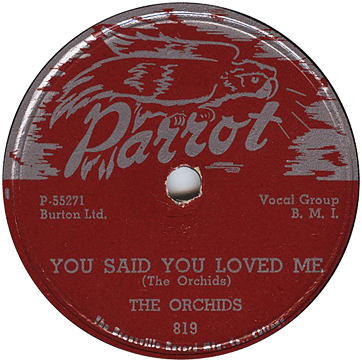
Vee-Jay NVD2-709 was a various-artists compilation released in 1993 under the title A Taste of Doo Wop, Volume 1. As noted above, it was the first release of all 8 sides that the Orchids recorded; again, the titling followed the Chess brothers' list of Parrot tapes, so "You Have Two" appeared as "Happiness." Relic CD 7053 was a various-artists collection released in 1993, after the Orchids' tapes were retrieved, under the title The Golden Era of Doowops: The Groups of Parrot Records. Relic CD 7073, its companion volume, was released in 1994 as The Golden Era of Doowops: The Groups of Parrot/ Blue Lake Records.
Robert Pruter (in Doowop: The Chicago Scene) identified the Orchids. Instrumentalists identified by ear by rlc. Red Holloway is obvious and is well featured on these sides. Willie Jones has a solo on "Met a Girl on the Corner." Red Holloway and Vernel Fournier confirmed Willie's presence here. After listening to the entire session, Vernel Fournier concluded that the drummer was either Paul Gusman or James Slaughter, but the syncopations were definitely not his. On "You Said You Loved Me," Willie Jones plays piano with his right hand and celeste with his left.
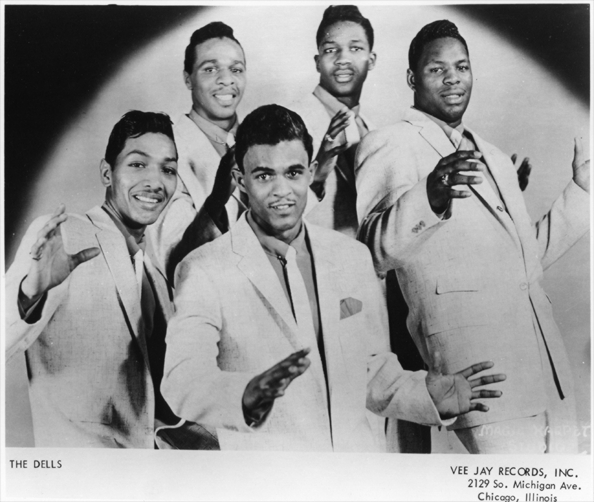
The Dells: Marvin Junior, Verne Allison, Mickey McGill, Johnny Funches, Chuck Barksdale (voc) acc. by Al Smith and his Orchestra: Al Smith (ldr); James "Red" Holloway (ts except -1); Norman Simmons (p); Paul "Guitar Red" Johnson (eg); prob. Quinn Wilson (b); Vernel Fournier (d).
Universal Recording, Chicago, September 15, 1955
| 55-322 | I Can't Help Myself | Solid Smoke LP 8029, Black Tulip 2636302 [CD], Collectables CD 7246 | |
| 55-323 | Zing Zing Zing (Allison) | Vee-Jay 166, Vee-Jay LP 1010, Charly LP 1056, Vee-Jay CD 701, Black Tulip 2636302 [CD], Collectables CD 7246 | |
| 55-324 | Dreams of Contentment (Allison) | Vee-Jay 166, Vee-Jay LP 1010, Upfront 103, Solid Smoke LP 8029, Vee-Jay CD 701, Famous Groove FG.971002 [CD], Black Tulip 2636302 [CD], Collectables CD 7204, Collectables CD 7246 | |
| 55-325 | She's Just an Angel -1 | Charly CRB 1055, Solid Smoke LP 8029, Vee-Jay CD 701, Black Tulip 2636302 [CD], Collectables CD 7246 |
Vee-Jay 166 was released in December 1955, according to Robert Ferlingere. Session information is from the MFD Files. Information about the line-up of the Dells is from Charly CRB 1055, From Streetcorner to Soul, a compilation of Dells recordings for Vee-Jay. It was released in 1985. Vee-Jay LP 1010, Oh What a Nite, was released in 1959.
Upfront LP 103, Stay in My Corner, came out in 1970. Solid Smoke LP 8029, Breezy Ballads & Tender Tunes, was issued in 1984. Vee-Jay CD 701, Dreams of Contentment, was released in 1992. Famous Groove FG971002 is a French compilation called Vee-Jay Doo Wop Volume 2: Bim Bam Boom! It was released in 1997. Black Tulip 2636302 is a bootleg CD titled The Dells: Oh What a Night. Released in 1998, it contains 28 tracks of Vee-Jay origin, all apparently derived from early 1990s Vee-Jay CDs or (in a few cases) the Solid Smoke LP series. Collectables CD 7246 (released in 2000) is titled The Very Best of the Dells. Collectables CD 7204, another release from 2000, is a collection titled Vee-Jay Rhythm & Blues: The Early Years Part One.
"I Can't Help Myself" has no instrumental solos, but there are brief tags by Red Holloway on tenor sax and Guitar Red. "Zing Zing Zing" has an intro by Guitar Red and a tenor sax solo by the other Red. "Dreams of Contentment" has no solos, but there is a prominent accompaniment by Red Holloway.
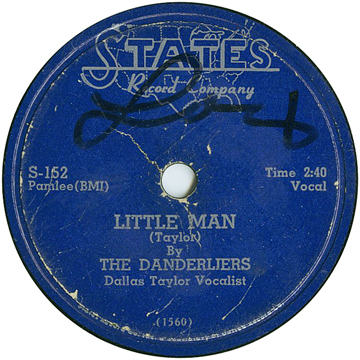
The Danderliers: Dallas Taylor (tenor and lead); James Campbell (tenor and lead); Bernard Dixon (tenor); Walter Stephenson (baritone); Louis Johnson (bass); The Drakes (voc): The Pastels (voc): Fred Buckley (lead); Norman Palm (1st tenor); Robert Randolph (2nd tenor); Charles McKnight (baritone); Charles Williams (bass); The Drakes: Tom Daniel (lead/tenor); Robert Anderson (tenor); Lincoln Mabins (baritone); William Anderson (baritone); Ira Anderson (bass).; with Al Smith (ldr); James "Red" Holloway (ts); prob. Horace Palm (p); prob. Quinn Wilson (b); Lefty Bates (eg); Vernel Fournier (d).
Universal Recording, Chicago, October 19, 1955
| 1560 | Little Man [Da voc] | States 152, Delmark DE-703 [CD], United U-163 [CD] | |
| 1561 | May God Be with You [Da voc] | States 152, Delmark DE-703 [CD], United U-163 [CD] | |
| 1562-7 | Bye Bye (Swift) [P voc] | Delmark DE-761 [CD] | |
| 1563-2 | Goodbye [P voc] | Delmark DE-761 [CD] | |
| 1564-4 | Take a Giant Step [Dr voc] | Delmark DE-776 [CD] | |
| 1565-4 | Let Them Talk [Dr voc] | Delmark DE-776 [CD] |
The session information comes from Bob Koester's discography of the United and States labels. Our personnel for the Danderliers is drawn from Robert Pruter's notes to Delmark DE-703; the personnel for the Pastels is from Doowop: The Chicago Scene. The personnel for the Drakes comes from Robert Pruter's interview with Tom Daniel (December 6, 2003).
States 152 was released during the first half of 1956. United U-163 is a bootleg CD issued in 1999 and titled Rare Windy City R&B Vocal Groups From the street-corners of Chicago Volume One. Delmark DE-761 is a 2002 compilation on CD, under the title Bang Goes My Heart: The Moroccos and Other Great Groups on United. Delmark DE-776 appeared in 2004 under the title Tell Me: The Five C's and Other Great Groups on United.
There is a tenor solo on "Little Man" and a prominent tenor sax part on "May God Be with You", weaving in and out of the vocal ensemble and coming more into focus in the final chorus; we formerly identified the soloist as Lucius Washington but further listening indicates that Red Holloway was on hand, not Little Wash. "Goodbye" features a rousing solo by Red with Lefty Bates taking the bridge; "Bye Bye," a "deep" ballad, has no space for instrumental solos at all. On "Take a Giant Step," Red Holloway has enough space for a forceful tenor solo, and on "Let Them Talk" he produces an exemplary intro, weaves through the vocal ensemble, and gets another solo.
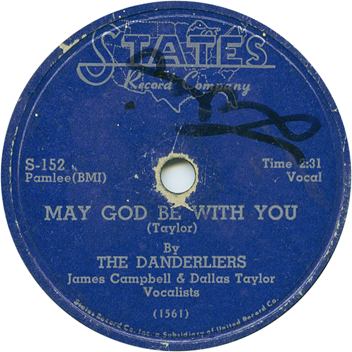
"Bye Bye," which carries no composer credit on Delmark DE-761, was actually written by Matt Swift—and recorded (perhaps in 1958; in any event Saturn B222/B223 was released in that year) by one of Sun Ra's doowop groups, The Cosmic Rays, on his Saturn label.
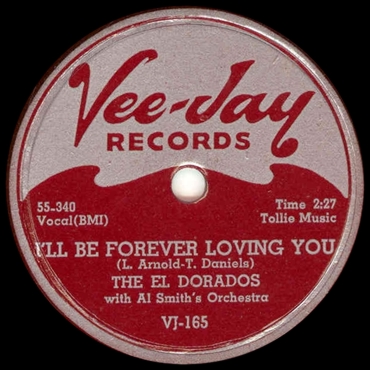
The El Dorados: Pirkle Lee Moses, Jewel Jones, Louis Bradley, James Maddox, Arthur Bassett, Richard Nickens (voc) -1 acc. by Al Smith Orchestra: Al Smith (ldr); Red Holloway (ts); McKinley Easton (bars); Horace Palm (p); Lefty Bates (eg); prob. Quinn Wilson (b); Vernel Fournier (d).
Universal Recording, Chicago, October 21, 1955
| 55-340 | I'll Be Forever Loving You^ -1 (L. Arnold-T. Daniels) | Vee-Jay 165^, Vee-Jay LP 1001, Oldies 45 OL142, Solid Smoke LP 8025, Charly LP 1022, Vee-Jay CD 702, Famous Groove FG. 971001 [CD], Collectables CD 7204, Collectables CD 7245 | |
| 55-341 | She Don't Run Around -1 | Vee-Jay NVD2-702, Collectables CD 7245 [?] |
Vee-Jay 165 was a single released in November 1955. It was mentioned in Cash Box on November 26 (p. 35) and advertised on the same date (p. 38). A bigger ad followed on December 3 (p. 32).
Oldies 45 OL142, on a Vee-Jay subsidiary that specialized in reissues, came out in 1964. On it the group is identified as "The Eldoradoes With Al Smith's Orchestra." Vee-Jay 702, Bim Bam Boom, was released on CD in 1992. Famous Groove FG 971001, Vee-Jay Doo Wop Volume 1: Oh What a Nite was released in 1997. Vee-Jay CD NVD2-716, Sax Appeal, was a various-artists compilation from 1993. Collectables CD 7204, Vee-Jay Rhythm & Blues: The Early Years Part One, is a various-artists compilation from 2000. There is also an El Dorados CD on Collectables CD 7245, The Very Best of the El Dorados
"She Don't Run Around" on the Famous Groove CD comes from the February 1956 session (see below). The Vee-Jay CD includes both versions. It is not clear which version is used on the Collectables CD.
In past editions of this discography we included 55-342 and 343, "Buttermilk" and "Fooling around Slowly," as part of this session (as their matrix numbers suggest they are). However, Red Holloway told Armin Büttner that these instrumental numbers were recorded at a local radio station in Gallatin, Tennessee, while the Al Smith band was on tour. He recalled that Randy Wood of Randy's Records was involved. Since Randy Wood was a major promoter of R&B in his part of the country, as well as the proprietor of Dot Records, this is plausible. Holloway recalls the date as 1951, but that would be too early for this lineup. Spring 1953 is much more likely. We have consequently moved these tracks to a new listing, Al11.
The instrumental personnel for this session were identified through the MFD Files. "I'll Be Forever Loving You" has a tenor sax solo by Red Holloway and characteristic high-stepping drumming from Vernel Fournier in his rock mode.
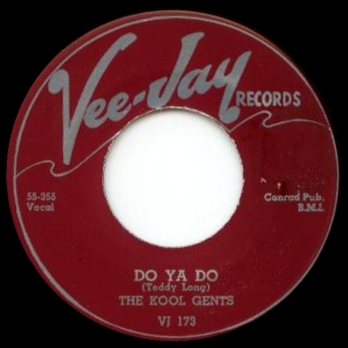
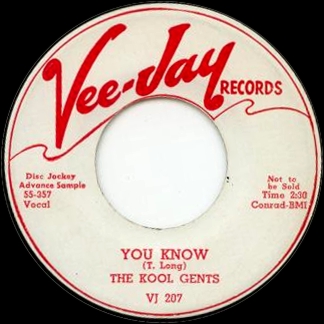
The Kool Gents: John McCall, Doug Brown, Delecta "Dee" Clark, Teddy Long, Johnny Carter (voc) with Al Smith (ldr); Ronald Hall (ts except -1); McKinley Easton (bars except -1); Lefty Bates (eg); Horace Palm (p); prob. Quinn Wilson (b); Vernel Fournier (d).
Universal Recording, Chicago, November 3, 1955
| 55-355 | Do Ya Do | Vee-Jay 173 | |
| 55-355 [alt.] | Do Ya Do [alt.] | Vee-Jay NVD2-715, Famous Groove FG 971001 [CD] | |
| 55-356 | Crazy over You | Solid Smoke LP 8026, Charly LP 1115, Charly CPCD 8000, Vee-Jay NVD2-709, Famous Groove FG 971001 [CD] | |
| 55-357 | You Know (T. Long) | Vee-Jay 207, Overseas Records [J] UPS 2274-V | |
| 55-357 [alt.] | You Know [alt.] | Vee-Jay NVD2-715, Famous Groove FG 971010 [CD] | |
| 55-358 | This Is the Night (T. Long) -1 | Vee-Jay 173, Oldies 45 OL104, Solid Smoke LP 8026, Overseas Records [J] UPS 2274-V, Vee-Jay NVD2-709, Famous Groove FG 971001[CD], Collectables CD 7204 |
Vee-Jay 173 was a single released in January 1956; Vee-Jay 207 appeared in August 1956, according to Ferlingere. The other side of Vee-Jay 207, "I Just Can't Help Myself," bears matrix number 56-491 and comes from a later session with a different band—just piano and rhythm.
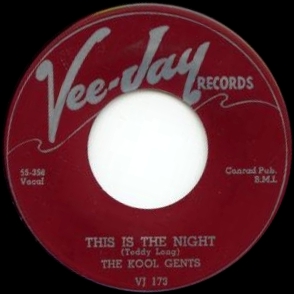
Our session information is derived from Robert Pruter, Doowop: The Chicago Scene. Information about the date and personnel from the MFD Files. Oldies 45 OL104 was an early 1964 release on a Vee-Jay subsidiary that operated from 1963 to 1965. "Crazy over You" was first issued on Solid Smoke LP 8026 in 1984 and reissued on Charly CPCD 8000, Zoom, Zoom, Zoom: Premier Doo-wop. Famous Groove FG 971001, Vee-Jay Doo Wop Volume 1: Oh What a Nite was released in 1997. Collectables CD 7204, Vee-Jay Rhythm & Blues: The Early Years Part One is a 2000 release.
Solid Smoke LP 8026 was a Dee Clark compilation, At His Best. Despite the billing, the leads on "Crazy over You" and "This Is the Night" are actually by John McCall. The leads on "Do Ya Do" and "You Know" are by Teddy Long.
"Crazy over You" has a tenor sax solo that sounds to us like the work of Red Holloway. However, there really was a Ron Hall who played tenor sax in Chicago; on at least one occasion, he was referred to by name in the minutes to the Local 208 Board Meeting. There are no instrumental solos on "This Is the Night," though Lefty Bates takes a turnaround.
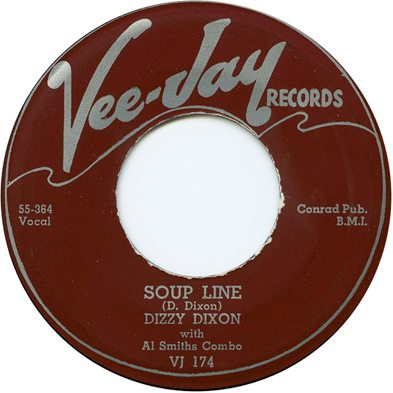
Dave "Dizzy" Dixon (voc); with Al Smith's Orchestra: Al Smith (ldr); Red Holloway (ts); Mac Easton (bars); Horace Palm (p); Lefty Bates (eg); prob. Quinn Wilson (b); prob. Vernel Fournier (d).
Universal Recording, Chicago, mid-November 1955
| 55-363 | Can't Afford It | unissued | |
| 55-364 | Soup Line (Dixon) | Vee-Jay 174 | |
| 55-364 | Soup Line [alt.] | Vee-Jay NVD2-718 [CD], P-Vine Special [J] PCD 5271/4 |
Vee-Jay 174 appeared in January 1956. Vee-Jay CD NVD2-718 was a various-artists compilation released in 1993 as A Taste of the Blues Volume 2; series supervision was by Billy Vera. P-Vine Special PCD 5271/4 is a 4-CD box, issued in 2000, titled Vee-Jay, The Chicago Black Music. We are guessing that the alternate take was used on the P-Vine set, but this remains to be checked.
We were alerted to this session by the listings for the Vee-Jay label by the late Marcel Chauvard. Additional help from Daniel Gugolz gave us the matrix number and both takes of this piece. "Soup Line" is a comic monologue, part spoken, part sung. The Vee-Jay Master Book is our source for the never-issued companion title "Can't Afford It"; our thanks to Big Joe Louis for bringing this item to our attention. The Vee-Jay Master Book refers to the protagonist as Dave Dixon.
The personnel on "Soup Line" was identified by ear; the date was arrived at by interpolation in the Vee-Jay matrix series. Red Holloway solos on both takes.
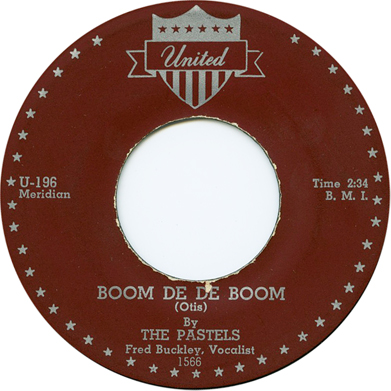
The Pastels (voc): Fred Buckley (lead); Charles McKnight (baritone); Norman Palm (first tenor); Robert Randolph (second tenor); Charles Williams (bass); accompanied by Al Smith (ldr); Red Holloway (ts); McKinley Easton (bars); prob. Horace Palm (p); Lefty Bates (eg); prob. Quinn Wilson (b); Vernel Fournier (d).
Universal Recording, Chicago, November 23, 1955
| 1566-6 | Boom De De Boom (Buckley) | United 196, United U-143 [CD], SHM9080 [CD], Delmark DE-761 [CD] | |
| 1567-5 | Put Your Arms around Me (Otis) | United 196, United U-143 [CD], Delmark DE-761 [CD] |
We added this session to the Al Smith list after hearing the bootleg reissues on United U-143, a 1999 CD titled Rare Windy City R&B Vocal Groups From the street-corners of Chicago Volume Two. All musicians were identified by ear. Red Holloway is prominent in the accompaniment to "Put Your Arms around Me"; he gets a substantial solo on "Boom De De Boom" with accompaniment by Mac Easton. "Boom De De Boom" is a rock 'n roll number.
"Boom De De Boom" is also on SHM9080, a 2000 release called Doo-Wopp for Dummies Volume 1. The CD is a 26-track various-artist collection; all of the titles are based on nonsense syllables ("Tick-Tock-Awoo" by the Turbans, and so on).
In 2002, all of The Pastels' recordings for United were included in Delmark DE-761, a CD compilation titled Bang Goes My Heart: The Moroccos and Other Great Groups on United.
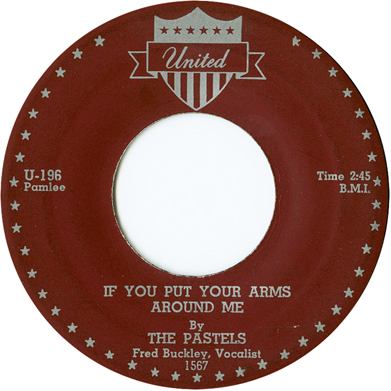
We continue with Al's sessions from 1956 to 1959, and one latter-day outing from 1965, in Part II.
This appendix contains three sessions for the Chance label, involving vocal groups accompanied by units with Red Holloway credited as leader. In the past, we lumped these units together with others under Al Smith's nominal leadership (after all, Red Holloway worked most of Al's recording dates during 1953-1954) and placed them in the main body of this discography. However, Red Holloway indicated that for the dates under his own name, he used a different rhythm section that did not include Al or Al's other regulars. As Holloway told Armin B&uum;ttner and Otto Flückiger in an interview, he used his regular group for these sessions: Louis Carpenter (piano), Hawk Lee (bass), and "Hendu" Henderson (drums).
The Flamingos: Sollie McElroy, Zeke Carey, Jake Carey, Johnny Carter, Paul Wilson (voc); with Red Holloway Orchestra: Red Holloway (ts, ldr); unidentified (tp except -1); prob. McKinley Easton (bars except -1); Louis Carpenter (p); Lefty Bates (eg); Hawk Lee (b); Robert "Hendu" Henderson (d).
Universal Recording, Chicago, c. August 1953
| C-5052 | Carried Away | Chance 1145, Vee-Jay 384, Vee Jay LP 1052, Constellation CS-3, Instant [Br] 5072 [CD], Vee-Jay 706 [CD], Uggh 501 [CD] | |
| C-5053 | Plan for Love | Chance 1149, Constellation CS-3, Vee-Jay CD 706, Uggh 501 [CD] | |
| C-5054 | You Ain't Ready | Chance 1149, Constellation CS-3, Vee-Jay CD 706, Uggh 501 [CD] | |
| C-5055 | Golden Teardrops -1 | Chance 1145, Vee-Jay 384, Vee-Jay VJLP 1021, Vee-Jay VJLP 1052, Constellation CS-3, Instant [Br] 5072 [CD], Vee Jay 706 [CD], Uggh 501 [CD] |
Chance 1145 was a 78 and 45-rpm single, released in September 1953. Chance 1149 was released in November 1953. (Release dates from Pruter's Doowop: The Chicago Scene. According to Bob Ferlingere, Chance 1145 was issued on both red and black vinyl, red being much rarer. Chance 1149 was issued with a yellow and black Chance label or a blue and silver one. The yellow and black label is rarer. There are also "repros" of both 1145 and 1149. In April 1961, "Carried Away" and "Golden Teardrops" were reissued on Vee-Jay 384, a 45-rpm single. They were given new matrix numbers in the Vee-Jay series: 61-1890 and 60-1435.
Vee-Jay LP 1052 was called Flamingos Meet the Moonglows "On the Dusty Road of Hits," and was released in 1962. Constellation CS-3, an LP released in 1964 under the title Collector's Showcase, Vol. 3: The Flamingos, consisted of the group's 13 sides for Chance. (Thanks to Robert Ferlingere for information about this release.) Instant 5072 is The Flamingos: I'll Be Home, a British CD released in 1993. Vee-Jay 706 was a CD titled The Flamingos Meet The Moonglows "On The Dusty Road Of Hits": The Complete 25 Chance Recordings, released 1993. Uggh 501,The Flamingos & The Moonglows: Their First Recordings, is a bootleg CD from 1998; it is a straight reissue of Vee-Jay 706 with the Moonglows' two sides for the Champagne label added.
"Carried Away" and "You Ain't Ready" have tenor solos by Red Holloway. Red Holloway has identified the rhythm section (except the guitarist) as his regular band at the time.
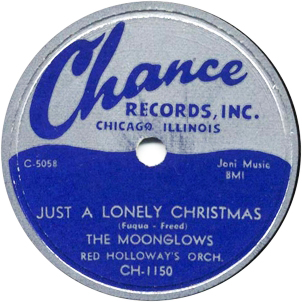
Universal Recording, Chicago, September 27, 1953
| U-5056 | Fine, Fine Girl | Chance 1166 (boot), Constellation CS-2, Vee-Jay 706 [CD], Uggh 501 [CD] | |
| U-5057 | My Love | Chance 1166 (boot), Constellation CS-2, Vee-Jay 706 [CD], Uggh 501 [CD] | |
| C-5058 | Just a Lonely Christmas (Fuqua-Freed) -1 | Chance 1150, Constellation CS-2, Vee-Jay 706 [CD], Uggh 501 [CD] | |
| C-5059 | Whistle My Love% | Chance 1147, Constellation CS-2, Vee-Jay 706 [CD], Uggh 501 [CD] | |
| C-5060 | Baby Please% | Chance 1147, Constellation CS-2, Vee-Jay 706 [CD], MCA/Chess CHD2-9345 [CD], Uggh 501 [CD] | |
| C-5061 | Hey Santa Claus | Chance 1150, Constellation CS-2, Vee-Jay 706 [CD], Uggh 501 [CD] |
Chance 1147 was issued in October 1953; Chance 1150 appeared in November 1953. All instrumentalists identified by ear. Gribin and Schiff mention the marooned Chance 1166, which never appeared during the lifetime of the label but showed up many years later as a bootleg "repro." (According to Robert Ferlingere, at least one of the Chance 1166 repros has one of these Moonglows tracks on one side and "September Song" by The Flamingos on the other.)
Red Holloway identified the rhythm section on this date. We previously misidentified the pianist as Willie Jones; it turns out that Lewis Carpenter was a devout follower of Willie's. Vocal lineup from Doowop: The Chicago Scene.
"Fine, Fine Girl" is said by some sources to have carried matrix number C-5050. However, Chauvard shows C-5050 as a number by The Five Echoes with the Fats Cole Band, and U-5056 as the matrix for "Fine."
"Fine, Fine Girl" (and "Baby Please," and most likely other items) were later purchased by Chess. Chess assigned the matrix number 9331 to "Fine, Fine Girl." MCA/Chess CHD2-9345 [CD] is Blue Velvet: The Ultimate Collection, released in 1993. Other Chess releases to be added.
All of the Moonglows' 12 sides for Chance appeared on Constellation CS-2 in 1964; the title was Collector's Showcase: The Moonglows. (Thanks to Robert Ferlingere for details).
The Moonglows: Bobby Lester, Harvey Fuqua, Pete Graves [Alexander Walter], Prentiss Barnes (voc except -1); with Red Holloway (ts, ldr); Louis Carpenter (p); Hawk Lee (b); Hendu Henderson (d).
Universal Recording, Chicago, January 10, 1954
| C-5088-7 | Secret Love | Chance 1152, Vee-Jay 423, Vee-Jay 706 [CD], Chess ACRR-701, MCA/Chess CHD2-9345 [CD], Uggh 501 [CD] | |
| C-5089 | I Was Wrong | Chance 1156, Constellation CS-2, Vee-Jay 706 [CD], Uggh 501 [CD] | |
| C-5090 | 219 Train | Chance 1161, Constellation CS-2, Vee-Jay 706 [CD], Uggh 501 [CD] | |
| C-5091 | My Gal | Chance 1161, Constellation CS-2, Vee-Jay 706 [CD], MCA/Chess CHD2-9345 [CD], Uggh 501 [CD] | |
| C-5092 | Ooh Rocking Daddy | Chance 1156, Constellation CS-2, Vee-Jay 706 [CD], Uggh 501 [CD] | |
| C-5093 | Real Gone Mama | Chance 1152, Constellation CS-2, Vee-Jay 423, Vee-Jay 706 [CD], Uggh 501 [CD] |
Chance 1152 was released before the end of January 1954; reputedly it was Chance's top seller in March of that year. Chance 1156 was released in June 1954; Chance 1161 (poorly distributed, as the label had just two months to live) came out in October. According to Tom Kelly, the 45-rpm issue of Chance 1156 has The Moonglows with Red Holloway Orch. on "I Was Wrong" and The Moonglows with Red Holloway's Orch. on "Ooh Rocking Daddy" (not Rockin' as we had it previously).
The session date and vocal personnel are from Bob Pruter's book Doowop: The Chicago Scene. Take 7 is announced before "Secret Love" on Uggh 501. There is a false start and a take announcement on Chess ACRR-701, a 1976 LP titled Moonglows.
The rhythm section was identified by Red Holloway in an interview. We previously misidentified Louis Carpenter (who in fact was a Willie Jones acolyte) as Willie himself.
Later in 1954, Carpenter went out on his own with a trio. Red Holloway continued to lead combos off and on for the rest of the 1950s.
Click here to Return to Red Saunders Research Foundation page.
Click here to Return to Robert Campbell's Home page..